


















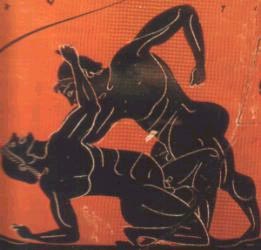
and
who reject anal penetration, promiscuity, and effeminacy

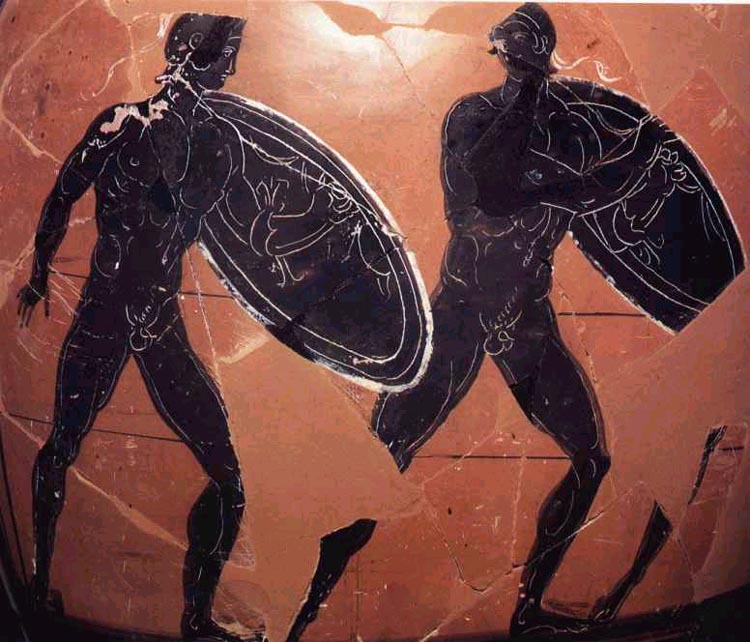


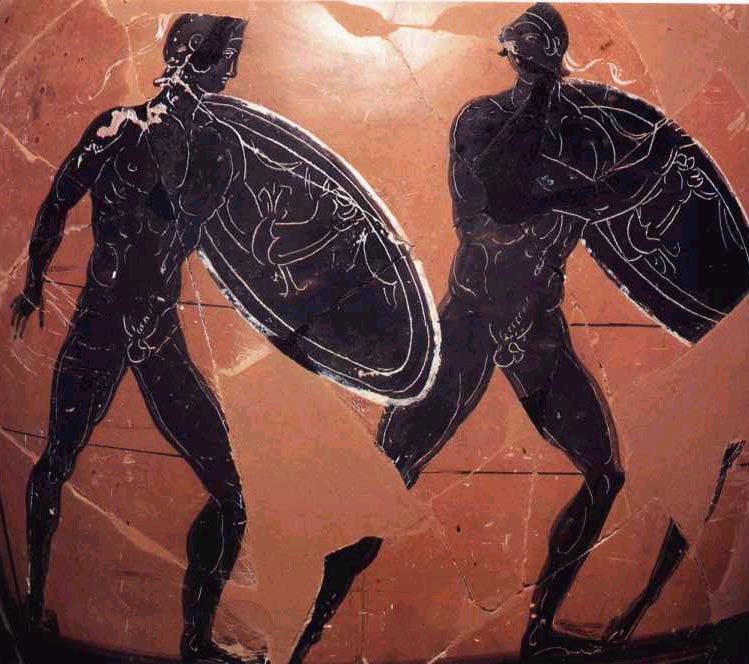


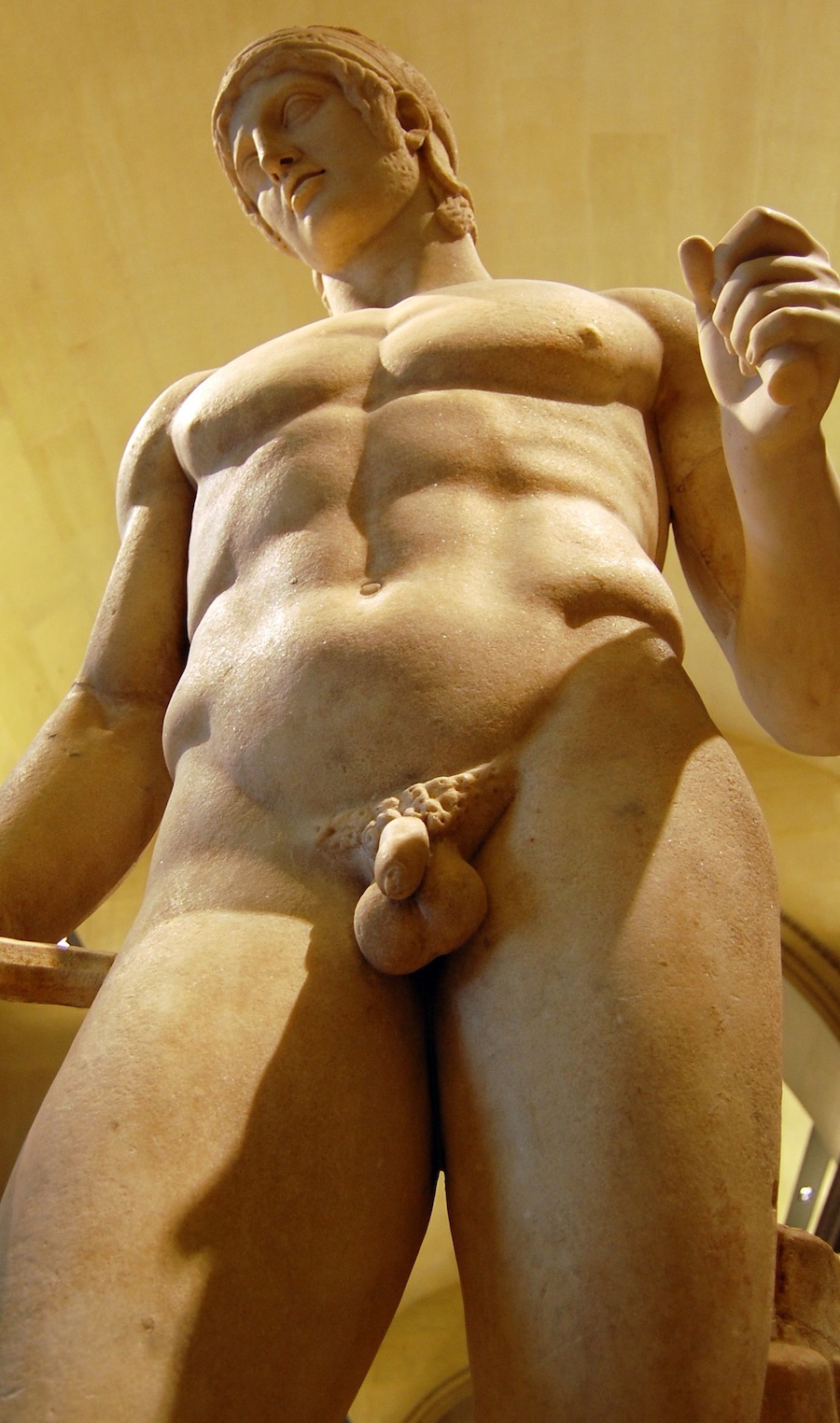



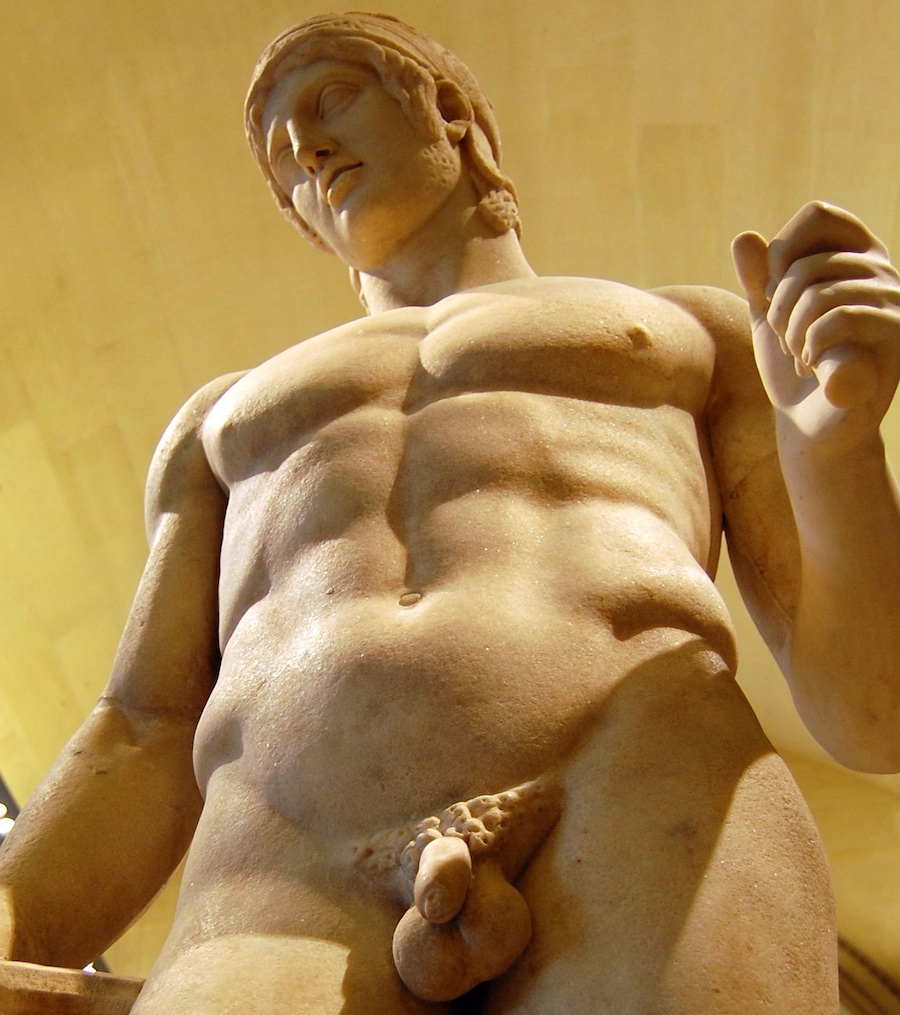


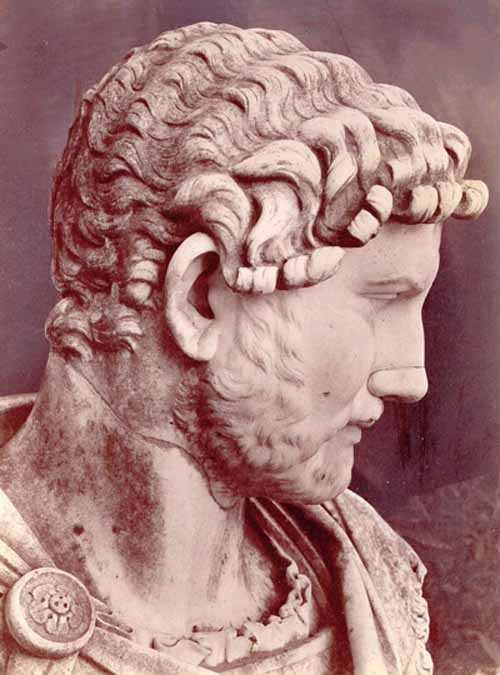
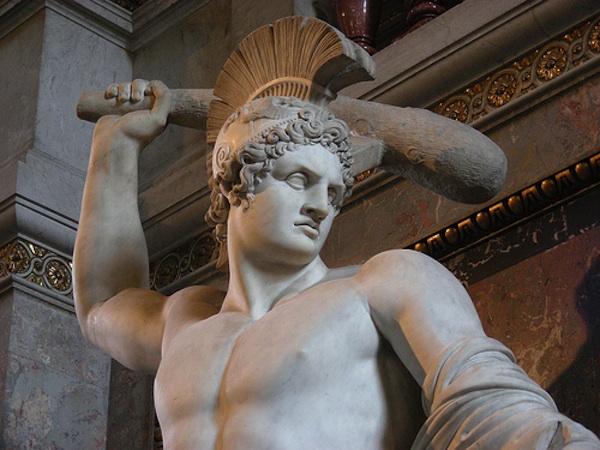
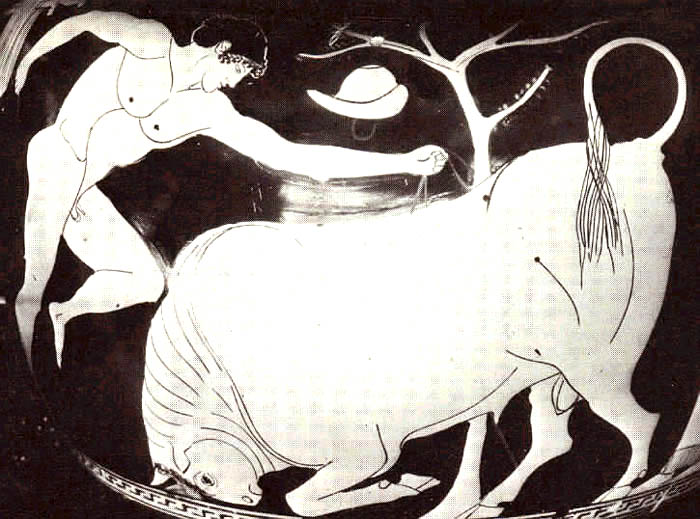




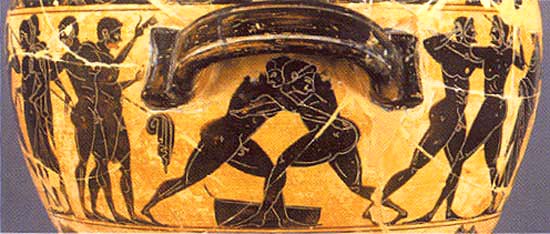

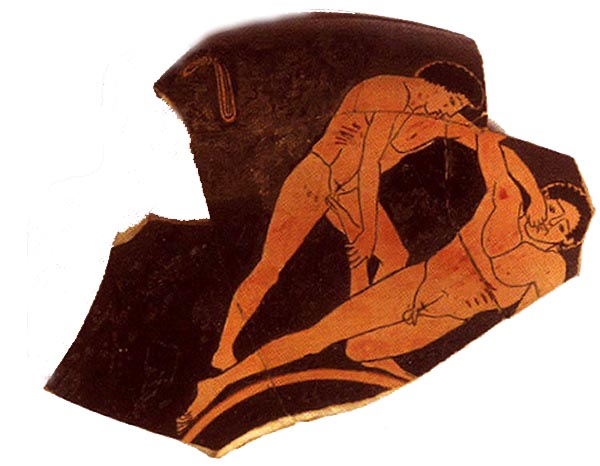
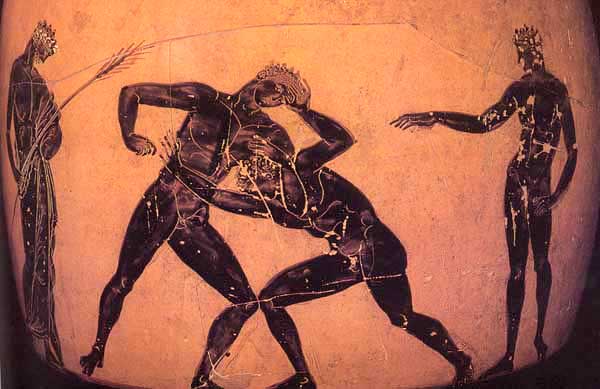
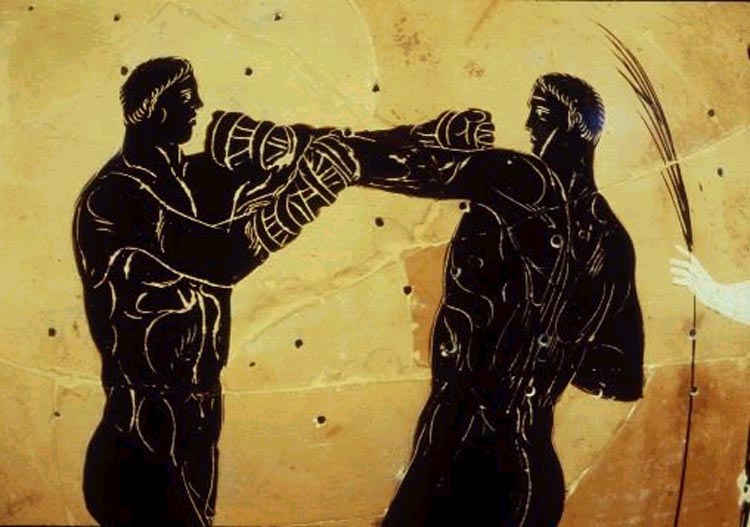
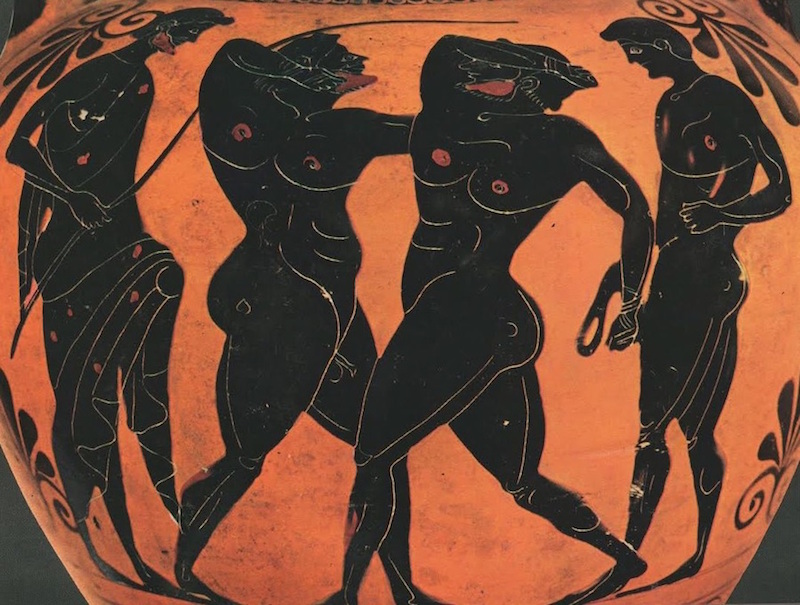
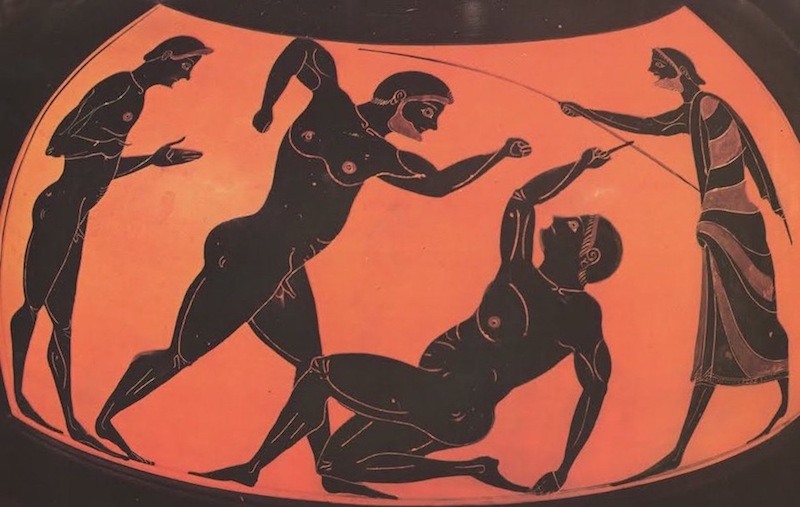
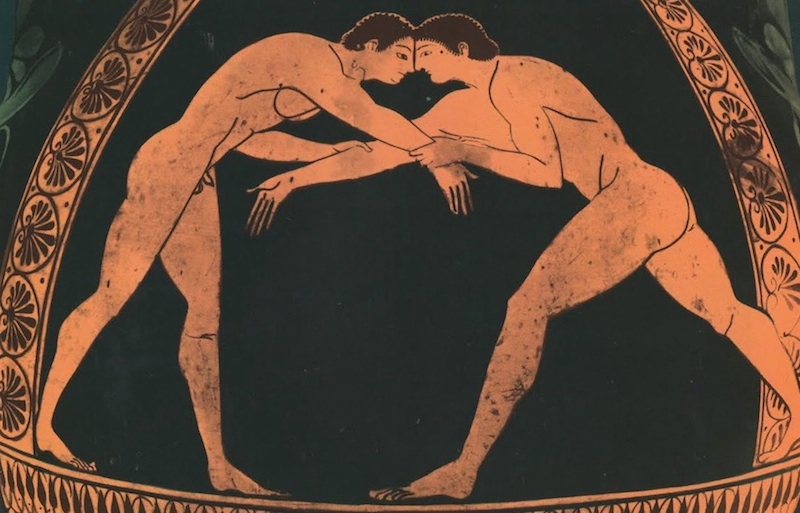
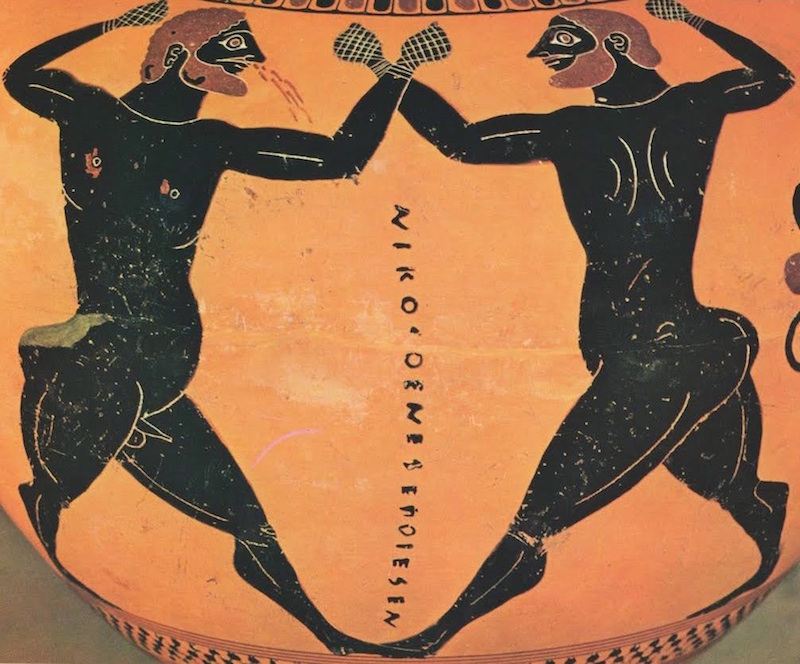
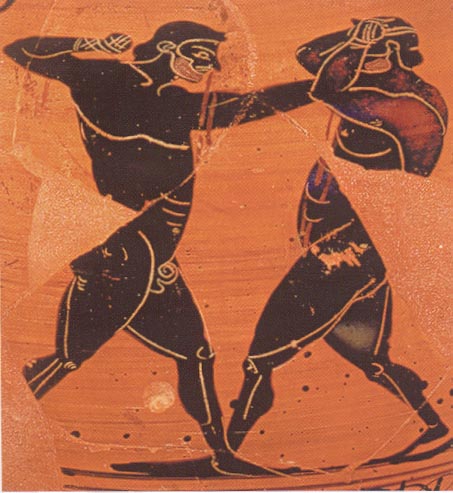
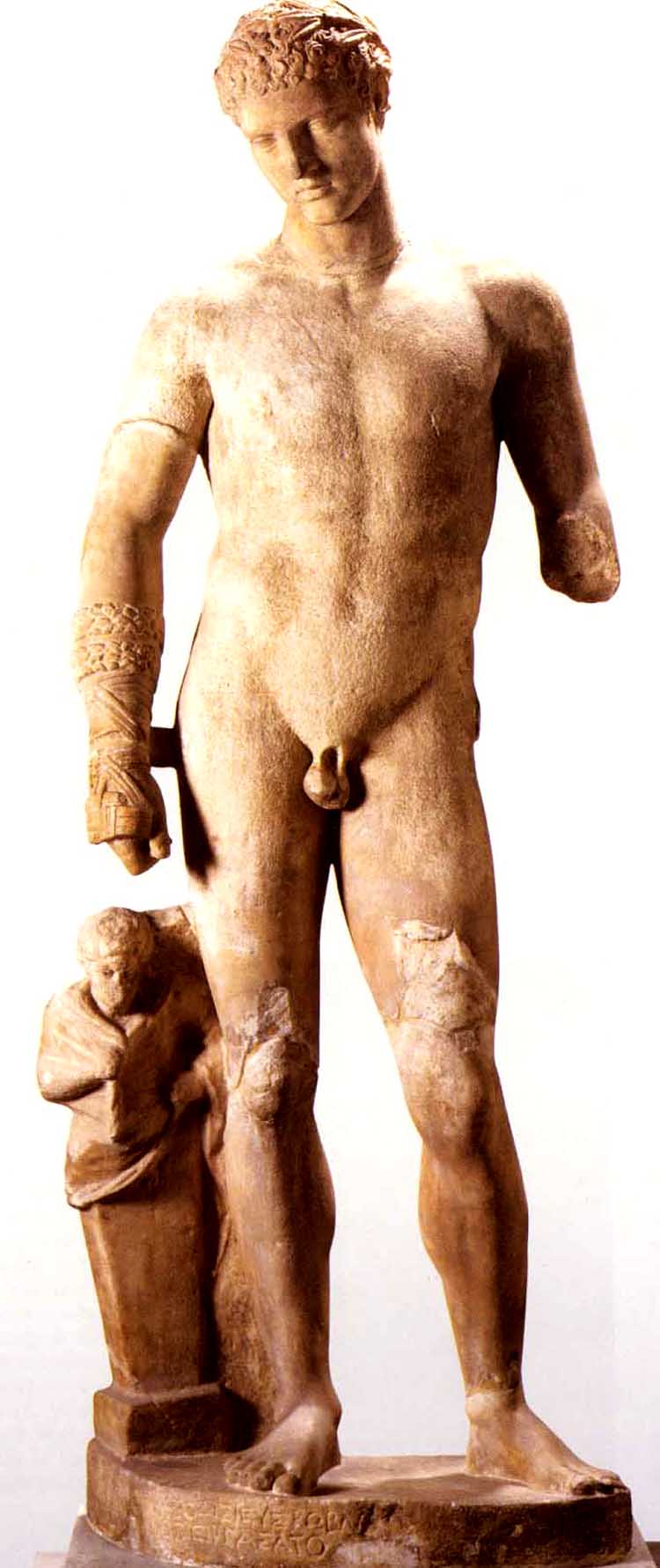




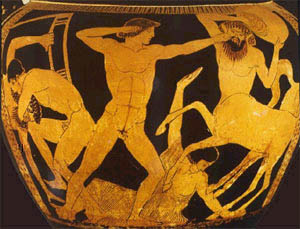
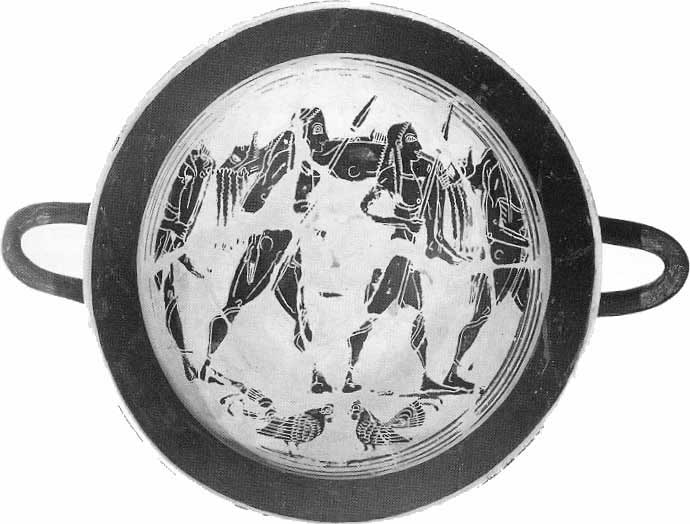
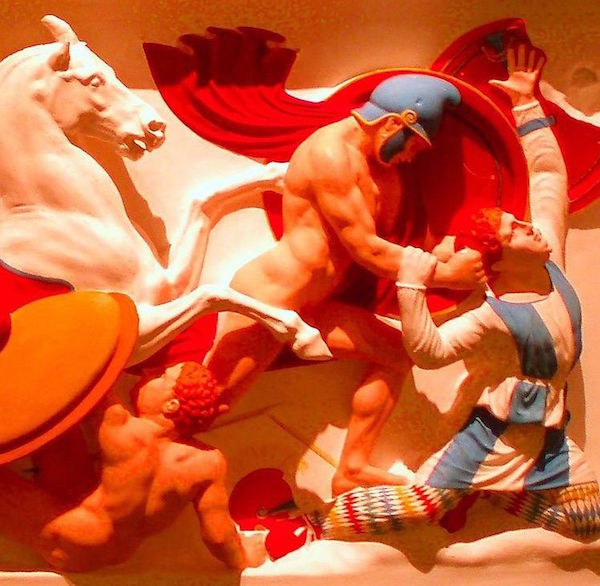
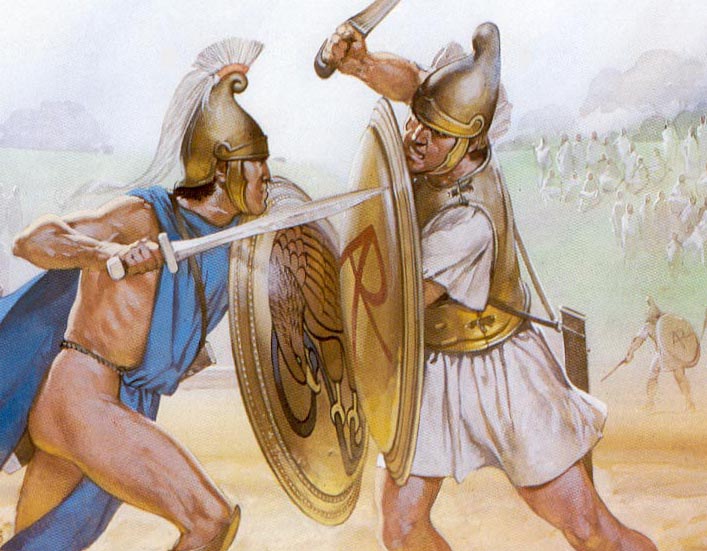
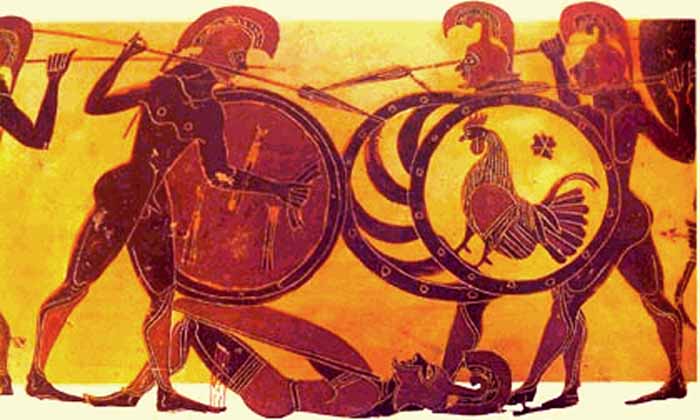
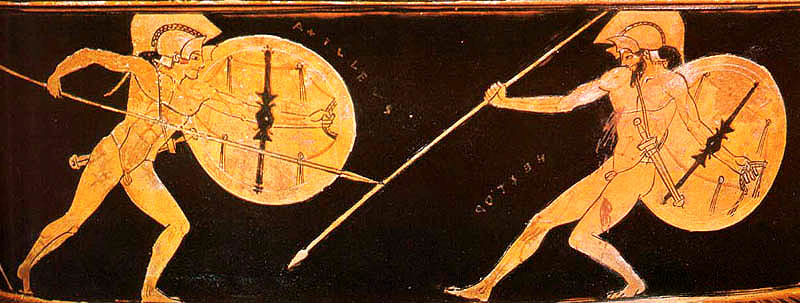
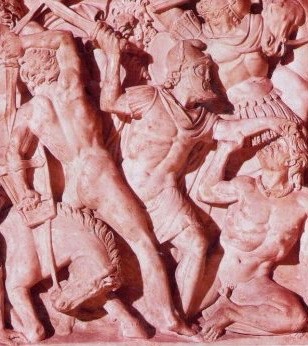








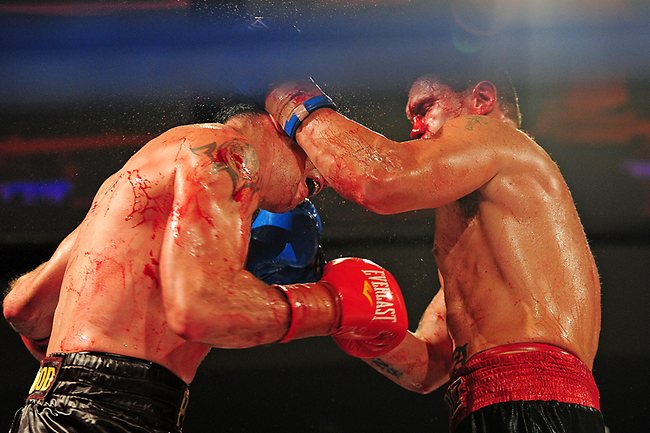






















By Bill Weintraub
Hi Guys.
Gais Marius was a Roman senator and general who lived from 157 to 86 BC.
His military abilities were so great that he was elected consul seven times -- an unprecedented honour.
In the following vignette from Plutarch's Life of Gaius Marius, Marius, following victories in Africa, has been asked by the Senate and People of Rome to stop an invasion of Italy by the Cimbri and Teutones, two Germanic tribes hitherto unknown to the Romans, who by their numbers -- more than 300,000 Warriors -- and ferocity in war -- have already destroyed five consuls and their armies -- and are thus and for good reason frightening to the Romans.
Plutarch :
[13] After Marius had set out for the front he gave his army an intensive course of training while on the route. There was practice in all kinds of running and in long marches ; and every Man was compelled to carry his own baggage and prepare his own meals.
This was the origin of the expression 'one of Marius' mules', applied later to any soldier who was a glutton for work and obeyed orders cheerfully and without grumbling.
Though others derive the expression from a different occasion. They say that Scipio, during the siege of Numantia [in Spain, 134 - 33 BC], decided to inspect not only the arms and the horses, but also the mules and baggage wagons, to see how the Men were looking after them and in what condition they were.
Marius [,then a soldier under Scipio's command], at this inspection, produced a horse which he had kept in splendid condition and a mule far healthier, easier to manage and stronger [euexia, praotes, kai rome] than any of the others. The general [Scipio] was delighted and would constantly mention these animals in conversation, so that it became a joke in the army to praise any hardworking, patient, industrious [philoponos] soldier by calling him 'one of Marius' mules'.
[14] Now Marius seems to have had a great stroke of luck. The oncoming wave of native tribes washed back again, as it were, and streamed first into Spain. This gave Marius time to toughen the bodies of his Men and to improve their morale and -- most important of all -- to make them understand what sort of a Man he was himself.
That fierce manner of his in command and his inflexibility in imposing punishments seemed to them, once they had got the habit of discipline and obedience, not only right and proper but a positive advantage. His angry temper, rough voice, and that forbidding expression with which they gradually grew familiar, seemed more terrible to the enemy then to themselves.
What particularly pleased the soldiers was his uprightness [orthotes -- erectness] in dispensing justice [krisis], an example of which can be found in the case of Gaius Lusius, a nephew of his, who was serving under him as an officer and who was not a bad man, apart from having a weakness for beautiful young Men [hessa meirakion kalon -- a weakness for handsome lads].
This Lusius fell in love with one of the young soldiers [neaniskoi -- youths] under his command, Trebonius by name, and made frequent unsuccessful attempts to seduce him.
Finally he sent a servant to him by night to fetch him to his tent. The young man [neanies -- youth] came, since he could not disobey an order ; but when he was brought into the tent and Lusius attempted to use violence [bia-zo] on him, he drew his sword and killed him [xiphos apokteino].
Marius was not with the army when this happened, but on his return, Trebonius was court-martialled.
As many spoke against him and no one was prepared to defend him [since he had killed a relative of Marius'], he boldly [eupharses] came forward himself and told the whole story, producing witnesses to show that Lusius had often made advances to him, which he had refused, and that, though large offers had been made to him, he had never prostituted himself to anyone.
Marius admired his behavior and was delighted with it. He ordered the crown [stephanos], which was the traditional decoration for valour [aristeia], to be brought and with his own hands placed it on the head of Trebonius, declaring that at a time which called for noble examples he had displayed most noble conduct [kalliston ergon].
This story was repeated in Rome and was of considerable help to Marius in securing his third consulship . . .
~Plut. Mar. 13.1 - 14.6, translated by Warner and Perrin.
And what's important to understand, and as we'll see in Section VII of Warrior Timogenesis, is that the word kalos in this instance, as in so many others, means both Noble and Honourable.
Indeed, there's no way to understand the ancient concept of Manly Honour without first understanding that such Honour is always Noble, just as Nobility is always Honourable.
Which is why I so often speak of Noble, Manly, Honour.




Now :
Because Lusius was Marius' nephew, that is to say, a member of his extended family and his clan, it would have been expected in the ancient world for Marius to execute Trebonius, his nephew's killer.
Instead, Marius praised Trebonius, for, in effect, defending his Manhood -- and had him decorated for Valour -- aristeia in Greek, which emanates from Lord Ares, as Liddell and Scott explain :
From the same root [ΑΡΗΣ -- ARES] come areté, ari-, areion [better -- stronger, braver, more Manly], aristos [best -- strongest, bravest, most Manly], the first notion of goodness being that of manhood, bravery in war; cf. Lat. virtus.
And Marius further said that "at a time which called for noble examples Trebonius had displayed most noble conduct [kalliston ergon]."
And the word translated as "noble" -- kalos -- also means honourable.
So that Trebonius' refusal to prostitute himself or allow himself to be raped -- was conduct most honourable and noble.
Plutarch also provides these insights into Marius' character :
As for the personal appearance of Marius, we have seen a marble statue of him at Ravenna in Gaul, and it very well portrays the harshness and bitterness of character which are ascribed to him. For since he was naturally virile [androdes] and fond of war [polemikos], and since he received a training in military rather than in civil life, his temper was fierce when he came to exercise authority.. . .
Born of parents who were altogether obscure -- poor people who lived by the labour of their own hands (Marius was his father's name, Fulcinia that of his mother), it was not till late that he saw the city or got a taste of city ways.
In the meantime he lived at Cirrhaeaton, a village in the territory of Arpinum, in a manner that was quite rude [agroikos] when compared with the polished life of a city, but temperate [sophron], and in harmony with the rearing which the ancient Romans gave their children [palai Romaion trophais].
[2] His first service as a soldier was in a campaign against the Celtiberians, when Scipio Africanus was besieging Numantia [134-33 BC], and he attracted the notice of his general by excelling the other young men in bravery [Andreia -- Manliness], and by his very cheerful [eukolos] acceptance of the changed regimen which Scipio introduced into his army when it was corrupted by luxury and extravagance [truphe kai polyteleia -- effeminacy and extravagance]. It is said, too, that he encountered an enemy and struck him down in the sight of his general.
[3] Therefore he was advanced by Scipio to many honours [Timais] . . .
~Plut. Mar. 2.1, 3.1-3, translated by Warner and Perrin.
Bill Weintraub :
So we see that Marius as a young man, as a young soldier, and having come from a modest and rural family and milieu where he'd absorbed the traditional Roman values of Farming and Fighting --
We can see that as a young man, as a young soldier, Marius displayed the twin Roman virtues of Manliness and Moderation, and that when it came to giving up effeminacy and extravagance, which had taken hold in the Roman army, Marius was eukolos -- willing, contented, and good-natured.
And Marius himself possessed aristeia -- manly excellence, manly prowess -- he took on an enemy warrior and killed him in single combat -- and that would have been when Marius was no more than 23 years old.
He was a very brave and very upstanding young Man -- andreios kai orthos -- Manly and Morally Erect -- and that's why his commander, the famed Scipio Africanus, who'd destroyed Carthage in 146, advanced Marius "to many honours."
It's not surprising, therefore, that Marius would despise anal, and reward a youth -- and based on the words Plutarch uses, it's unlikely that Trebonius was more than 18 years old --
It's not surprising that Marius would reward and honour a youth who'd slain a male who was attempting to rape him.
Indeed, to better understand the Roman attitude towards anal penetration, it's helpful to look at two Latin words : Corruptio, and Caenum :
Corruptio : I. Act., a corrupting, spoiling, seducing ; II. Pass., a corrupt condition, corruption Please note:The word corruptio is used by writers like Tacitus to indicate corruption through anal penetration.
For example, in the Annals, Tacitus says that the teen-aged and already monstrous Nero was "corrupting" his younger step-brother Britannicus through anal penetration, and -- that being the case -- it's just as well that Nero chose not long thereafter to kill Britannicus -- whose life had been ruined -- by that corruption.
Ancient writers -- great Humanists and Moralists -- like Tacitus and Plato -- did not mess around or mince words when it came to anal.
Related:
Phthora
Caenum : dirt, filth, mud, mire ; Fig., filth, dirt, uncleanness ; vile fellow In the Germania, Tacitus uses caenum to indicate a male who's anally receptive. He says that the Germans punish the cowardly, the unwarlike, and "the male stained with the filth of abominable vice" by forcing them face down into a bog, and putting a weight atop them, because "infamy ought to be buried out of sight."'ignavos et imbelles et corpore infames caeno ac palude'
Mattingly : "cowards, shirkers, and sodomites are pressed down under a wicker hurdle into the slimy mud of a bog . . . because deeds of shame ought to be buried out of men's sight"
The great nineteenth-century Latinist Harry Thurston Peck says that Roman literature has a "predominant tone of sober directness and moral strength."
And you can see that sober directness and moral strength very clearly in Tacitus.
To learn more, see our entry under Ennius.
Related:
So :
In Latin, there's the caenum, "the male stained with the filth of abominable vice," who is both the product and purveyor of corruptio ;
But standing Erect and Opposed to the caenum there's the
Vir : a man ; a man of courage, principle, or honor, one who deserves the name of a man ; in military usage, Vir often refers to a soldier -- a Warrior. Man is Vir, Man is Warrior.
And the same is true of the ancient Greek word aner -- Man :
According to the LSJ, "ανηρ alone always means a man in the prime of life, esp. warrior, Il. 15.328, Th. 2.103 ; the several ages are given as 'παις, μειρακιον, ανηρ, πρεσβυτης' X. Smp.4.17."
Which of course is correct, and the reason that nineteenth-century translators such as Rawlinson frequently render ανηρ as Warrior :
Because to the Greeks, as to the Men in any and all Warriordoms, Man and Warrior are synonymous.
So, and again,
In Latin, Man is Vir, Man is Warrior.
And a Man, a Warrior, is a Man of Courage, Principle, or Honour, one who deserves the name of a Man.
A Warrior is a Man of Honour.
And there are three words derived from Vir :
Virilis : of or belonging to a man, manly, virile ; male, masculine ; worthy of a man, manly, manful, firm, vigorous, bold, spirited, etc Virilitas : manhood, virility, manliness, manly vigor ; also, the organs of generation Virtus : Manliness, Manhood, i. e. the sum of all the corporeal or mental excellences of Man, Vigour, Strength, Might, Power, Mastery, Potency ; Valour, Gallantry, Fortitude ; Manly Virtue, Manly Goodness, Manly Moral Perfection and Self-Control, Manfully High Character ; Virile Value, Martial Merit, Warrior Worth. And that's what Andreia, Areté / Areta, and Virtus all mean -- Manhood -- Fighting Manhood -- and all the Noble Excellences and Virile Virtues which Fighting Manhood brings to those Men who, in their own lives, celebrate and exalt it : Vigour, Strength, Might, Power, Mastery, Potency ; Valour, Gallantry, Fortitude ; Manly Virtue, Manly Honour, Manly Goodness, Manly Moral Perfection and Self-Control, Manfully High Character ; Virile Value, Martial Merit, Warrior Worth.
However, as a prominent historian of Rome, Thomas Wiedemann, demonstrated in his award-winning book Emperors and Gladiators, there's one element or attribute of Virtus / Areté / Areta / Andreia which is more important than the others :
Single combat was the context in which a Roman had to prove that he possessed the most important constituent of 'virtue' [that is, Virtus, which is Fighting Manhood].
. . .
It was this same quality, the courage to confront an opponent coupled with the technical ability to maim and/or kill him, which the gladiator instantiated [made concrete].
So :
Single combat was the context in which a Roman had to prove that he possessed the most important constituent of Virtus, which is Fighting Manhood : the courage to confront an opponent coupled with the technical ability to maim and/or kill him.
"the courage to confront an opponent" is Willingness
"the technical ability to maim and/or kill" is Ability
And what's true for the gladiator is true of the ordinary -- that is to say, Free -- Warrior in both Rome and ancient Greece :
Virtus-Areté-Areta-Andreia is the Willingness and Ability to Fight.
That's to say, the Willingness to Confront an Opponent coupled with the Ability to Defeat Him.
F I G H T I N GxxM A N H O O D
IS
THE ARDENT WILLINGNESS
AND
REQUISITE ABILITY
TO FIGHTAnd in both Rome and Greece, that Willingness and Ability was without question the single most important component, the most important constituent, as Wiedemann says, of Virtus, which is Areté / Areta, which is Manly Excellence, which is Fighting Manhood.
F I G H T I N Gxx M A N H O O D
The Fighter's Willingness to Confront his Opponent, the Courage he needs to Confront his Opponent,
is instantiated by his battered and bloody face ; while his raised arms instantiate his Ability --
the martial merit, virile value, and warrior worth, he needs -- to Defeat his Opponent.Also related to Vir:
Vis : cf. [compare to Greek] ις, Strength, force, vigor, power, energy, virtue ; Hostile strength, force, violence, compulsion ; Plur, military forces, troops ; Fig., mental strength, power, force, energy, vigor, influence ; Force, notion, meaning, sense, import, nature, essence
So, to the Romans, as to the Greeks, a Man's Happiness could be found not in bending over, but in standing Erect :
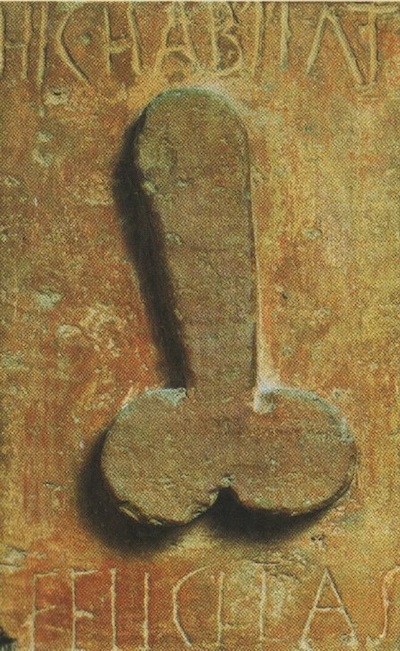
Indeed, the disembodied Phallus often appears in Roman mythology.
Plutarch :
to morion andros gonimon -- the Generative Member of a Man :
Morion : μοριον, το, prop. Dim. of μορος, A. piece, portion, Hdt. 7.23, Pl. R.525e, etc. ; II. constituent part, member (opp. μερος, a mere part) ; 2. esp. of the members or parts of the body : in pl., esp. parts or genitals, male and female, ανδρεια μορια, masculine parts, Luc. Vit. Auct.6 : less freq. in sg., μοριον ανδρος γονιμον, the generative member of a man Pl.323b ; 3. of persons, member of a council, etc., Arist. Pol.1282a37 ; III. Gramm., part of speech, D. H. Comp.6, A.D.Pron.36.21, al. ; 2. prefix or suffix, opp. μερος (part of a word), Corn. ND13, EM141.47,809.9 ; IV. Arith., fraction with 1 for numerator, Dioph. 1p.6T. ; also, fraction in general, Id.5.20,al. ; denominator of a fraction, Id. 1.23, al.
In Plutarch's Regarding the Fortune of the Romans, there's this : suddenly, as the flames died down, the member of a man rose up out of the hearth
And the words in Greek are : μοριον ανδρος γονιμον, the generative member of a man
The member appears to a captive slave girl, Ocrisia, of great beauty and character ; learning of this, the Roman Queen Tanaquil, "an intelligent and understanding woman," dresses Ocrisia in bridal clothes and locks her in the room with the apparition.
And there is born of the union of Ocrisia and the phantom Masculine Member, a male baby who grows up to be King Servius Tullius of the Romans.
~Plut. De Fort. Rom. 10, translated by Helmbold.
See also :
Virilis -- membrum virile
And that's not the first appearance of a disembodied Phallus in Roman mythology.
Plutarch :
To begin with, who would not at once declare touching the birth, the preservation, the nurture, the development of Romulus [the founder of Rome], that Fortune laid the foundations, and that Virtue [Areta -- Manhood] finished the building? In the first place, then, it appears that the circumstances surrounding the origin and the birth of the very founders and builders of Rome were of a marvellous good fortune. For their mother is said to have consorted with a God [,the great Warrior God Mars, primogenitor of the Roman people, who first appeared to her as His Martial Genius in the form of His disembodied Phallus rising from the hearth] ; and even as they relate that Herakles was conceived during a long night (for the day was retarded in contrariety to nature, and the sun delayed), so regarding the generation and conception of Romulus they record that the sun was eclipsed and came into exact conjunction with the moon at the time when Mars, a God, consorted with the mortal Silvia.And this same thing, they say, happened to Romulus also at the very time of his translation from this life ; for they relate that he disappeared during an eclipse of the sun on the Capratine Nones, on which day, even to the present time, they hold high festival.
Later, when the children were born and the despot gave orders to do away with them, by the decree of Fortune no barbarous or savage servant but a compassionate and humane man received them, with the result that he did not kill them ; but there was a margin of the river, bordering upon a green meadow, shaded round about with lowly shrubs ; and here the servant deposited the infants near a certain wild fig-tree, to which people later gave the name Ruminalis. Then a she-wolf, that had newly whelped, with her dugs distended and overflowing with milk because her young had perished, being herself in great need of relief, circled around the infants and then gave them suck, thus ridding herself of the pain caused by the milk as if it had been a second birth-pang.
~Plut. De Fort. Rom. 8, translated by Babbitt and Helmbold.
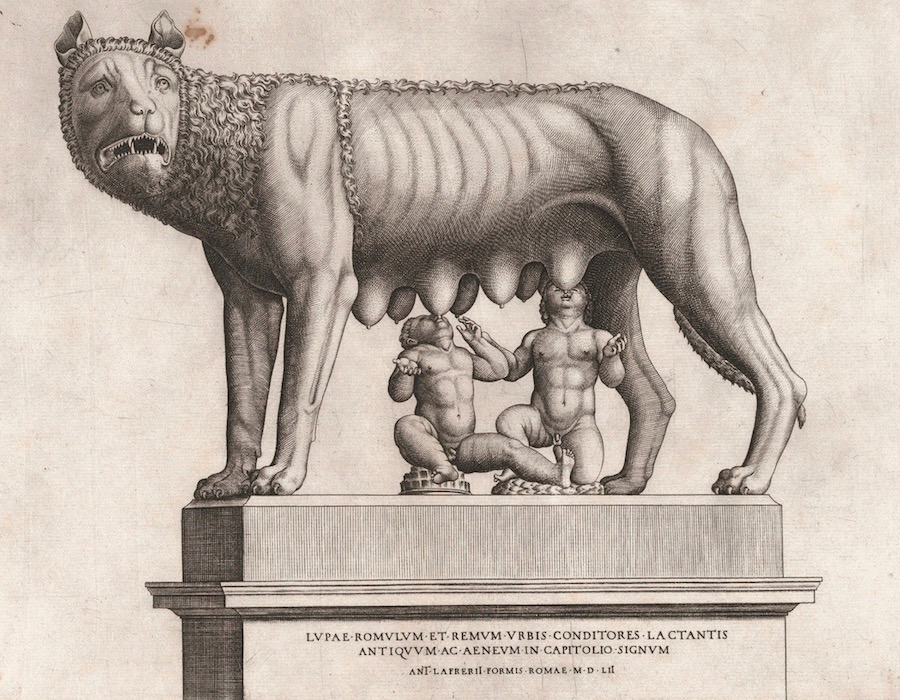
And Plutarch tells the same story in his Life of Romulus :
Moreover, we are told that they were named, from 'ruma,' the Latin word for teat, Romulus and Romus (or Remus), because they were seen sucking the wild beast. Well, the noble size [eugeneia] and beauty of their bodies [somaton], even when they were infants, betokened their natural disposition :
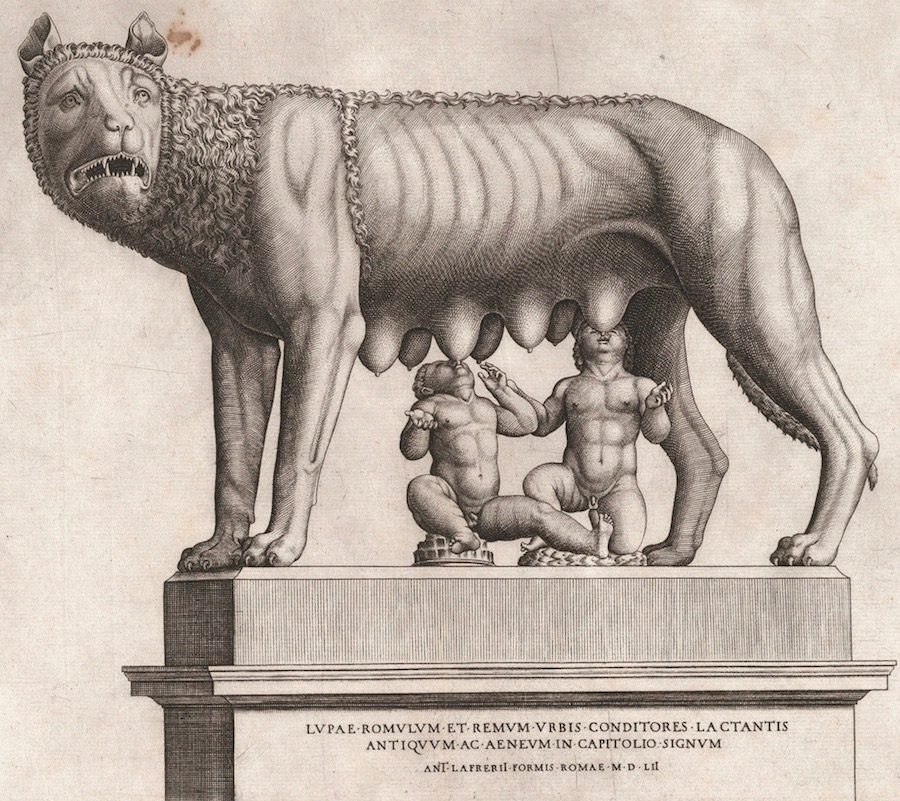
And when they grew up, they were both of them courageous and manly [thumoeides kai androdes], with spirits which courted apparent danger, and a daring [tolma] which nothing could terrify. But Romulus seemed to exercise his judgement more, and to have political sagacity, while in his intercourse with their neighbours in matters pertaining to herding and hunting, he gave them the impression that he was born to command rather than to obey.
With their equals or inferiors they were therefore on friendly terms, but they looked down upon the overseers, bailiffs, and chief herdsmen of the king, believing them to be no better men than themselves, and disregarded both their threats and their anger. They also applied themselves to generous occupations and pursuits, not esteeming sloth and idleness generous, but rather bodily exercise [gymnasion -- nude bodily exercise], hunting, running, driving off robbers, capturing thieves, and rescuing the oppressed from violence. For these things, indeed, they were famous far and near. . . .
~Plutarch, Life of Romulus, 3.2 ff, translated by Perrin.
And then, 1900 years later, the great British politician, historian, and poet, Thomas Babington Macaulay, tells the story again in his :
THE PROPHECY OF CAPYS
They were doomed by a bloody king :
They were doomed by a lying priest :
They were cast on the raging flood :
They were tracked by the raging beast :Raging beast and raging flood
Alike have spared the prey ;
And to-day the dead are living :
The lost are found to-day.V
The troubled river knew them,
And smoothed his yellow foam,
And gently rocked the cradle
That bore the fate of Rome.The ravening she-wolf knew them,
And licked them o'er and o'er,
And gave them of her own fierce milk,
Rich with raw flesh and gore.
And here you see the ravening she-wolf who knew the boys, and licked them o'er and o'er, and gave them of her own fierce milk, rich with raw flesh and gore.

And on that diet of fierce milk, rich with raw flesh and gore, the infants quickly develop beautiful bodies [somaton] of noble size [eugeneia] :

And that's a truly brilliant image of Rome and the nature of Rome, the she-wolf nurturing Romulus and Remus, the Sons of Mars, with her own fierce milk, rich with raw flesh and gore.

Because Rome is a Warriordom ; and --
Because Raw Flesh and Gore are very much part of the Warrior's Life :

Plutarch :
And a bird sacred to Mars, which they call the woodpecker, visited them and, perching near on tiptoe, would, with its claw, open the mouth of each child in turn and place therein a morsel, sharing with them a portion of its own food. Wherefore they named this wild fig-tree Ruminalis, from the teat (ruma) which the wolf offered to the children as she crouched beside the tree. And for a long time the people who dwelt near this place preserved the custom of never exposing any of the new-born infants, but they acknowledged and reared them all, in honour of Romulus's experience and the similarity of the childrens' case with his.And, in truth, the fact that they were not discovered while they were being reared and educated in Gabii, and that it was unknown that they were the sons of Silvia and the grandchildren of king Numitor surely appears to have been a furtive and shrewd device of Fortune, so that they might not, because of their lineage, be put to death before performing their tasks, but that they might in their very successes be discovered, by bringing to notice their noble qualities as tokens by which to recognize their high birth.
At this point there occurs to me the remark of a great and prudent general, Themistocles, which was made to certain of the generals who came into favour at Athens after him and felt that they deserved to be rated above him. He said that the Day-After contended with the Feast-Day, saying that the Feast-Day was full of wearying tasks and labours, but on the Day-After men enjoyed in quiet all things that had been made ready. Then the Feast-Day said, 'What you say is true ; but if I had not been, where would you be?' 'And so,' said Themistocles, 'if I had not been at the time of the Persian Wars, what benefit would now come from you?'
And this, methinks, is what Fortune says to the Virtue -- the Fighting Manhood -- of Romulus : 'Brilliant and mighty are your deeds, and in very truth you have proved yourself to be divine in blood and birth. But do you observe how far you fall behind me? For if, at the time of his birth, I had not accompanied him in a helpful and humane guise, but had deserted and abandoned the infants, how could you have come into being and whence had you derived such lustre? If on that occasion there had not come to them a female beast swollen with the abundance and the burden of her milk, and in need of some creature to be fed rather than of something to yield her sustenance, but if instead there had come some utterly savage and ravening creature, would not even now these fair palaces and temples, theatres, promenades, fora, and public buildings be herdsmen's huts and folds of shepherds who paid homage to some man of Alba or Etruria or Latium as their lord?'
The beginning, as every one knows, is of supreme importance in everything, and particularly in the founding and building of a city ; and this Fortune provided, since she had preserved and protected the founder. For Manhood made Romulus great, but Fortune watched over him until be became great.
~Plut. De Fort. Rom. 8, translated by Babbitt and Helmbold.

So :
This is where Happiness is found :




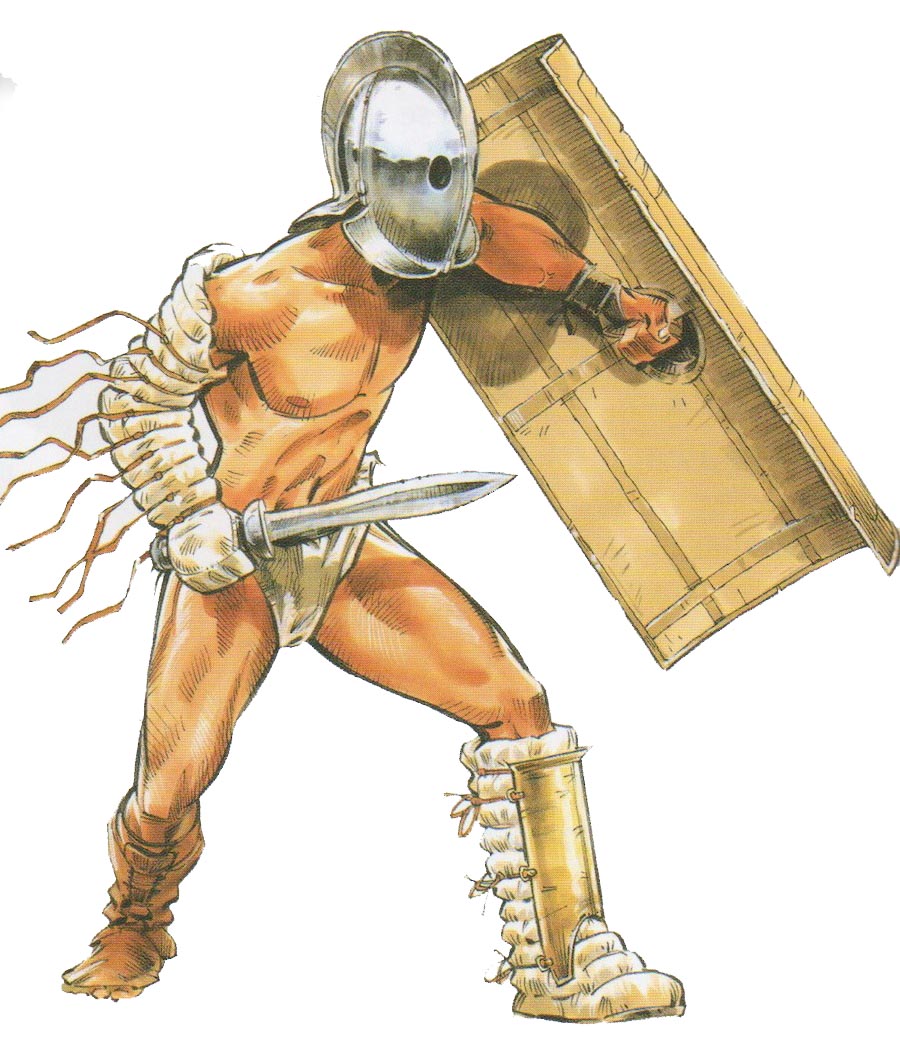


The Romans understood that.
All who worshipped the True Gods understood it.
As Alain Danielou says :
It is only when the penis stands up straight that it emits semen, the source of life. It is then called the Phallus, and has been considered, since earliest prehistory, the Image of the Creative Principle, a symbol of the process by which the Supreme Being procreates the Universe.
This is not the case of a symbol plucked at random but the recognition of the continuity of the process that links all the various levels of manifestation, according to cosmological theory. The Phallus is really the image of the Creator in Mankind, and we rediscover the worship of it at the origin of every religion.
A source of pleasure, the Phallus evokes Divine Bliss, the Being of Joy. Within the microcosm of the living being it represents the Progenitor, who is always present in its work.
Contempt for this sacred emblem, as well as degradation and debasement of it, pushes man from the divine reality. It provokes the anger of the Gods and leads to the decline of the species. The man who scorns the very symbol of the life principle abandons his kind and himself to the powers of death.
The Romans understood that.
Marius understood it.
He understood that Vir-Virilis-Virilitas-Virtus -- Manliness, Fighting Manhood -- is Happiness.
And that to abandon Manliness and its Fighting Manhood -- is misery.
And so, for defending his Sacred Manliness, for refusing to prostitute himself or let himself be raped, Marius awarded Trebonius the Crown of Valour, the Crown of Fighting Manhood.
And Marius further said that "at a time which called for noble examples Trebonius had displayed most noble conduct [kalliston ergon]."
And the word translated as "noble" -- kalos -- also means honourable.
So that Trebonius' refusal to prostitute himself or allow himself to be raped -- was conduct most honourable and noble.




So :
There was a time when Men who refused to be penetrated anally, rather than being mocked, and derided, denigrated, and despised, were awarded their nation's Medal of Honour.
And there was a time when Men who violently resisted analist rape -- as those of you who've read No Small Calamity know -- became not merely national Heroes, but Heroes whose Heroism was celebrated cross-culturally and across many centuries.
There was a time.
That time could come again.
It could be here now.
It just takes the will to make it happen.
It just takes the will.
Recently, I was talking to NW about his favorite topic, naked wrestling and other naked fighting.
And he was saying that it had essentially disappeared from our world.
To which I replied :
Right.
But it was the norm in ancient Greece, and in the later Greco-Roman world.
That's what you have to remain crystal clear about.
It's impossible to find in our world.
It was normative in theirs :



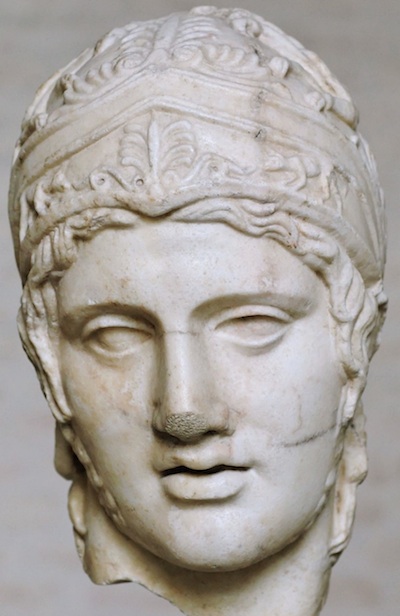



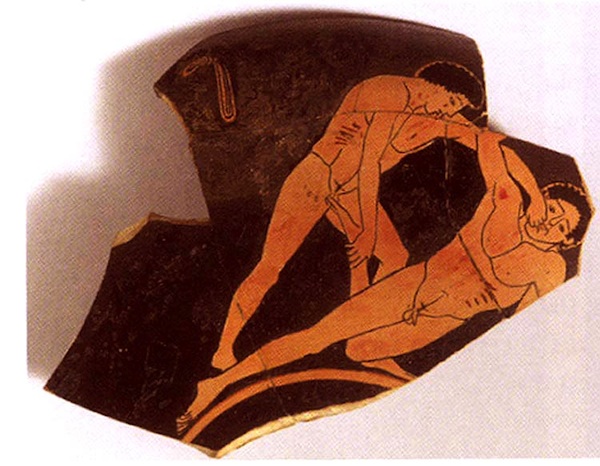



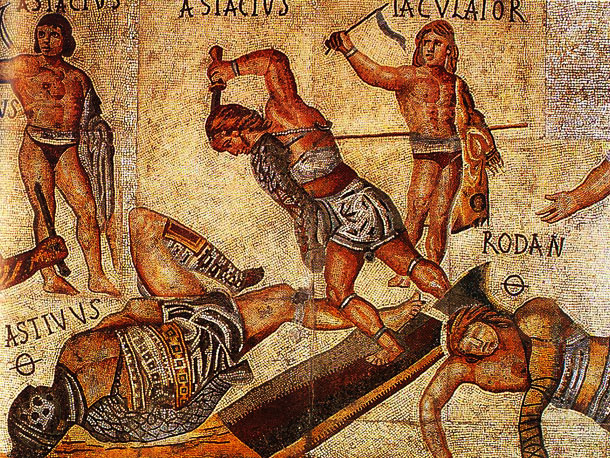



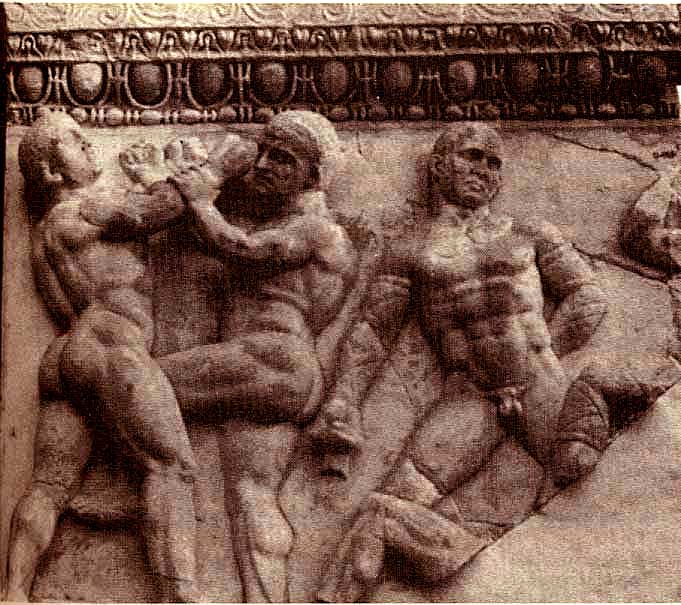











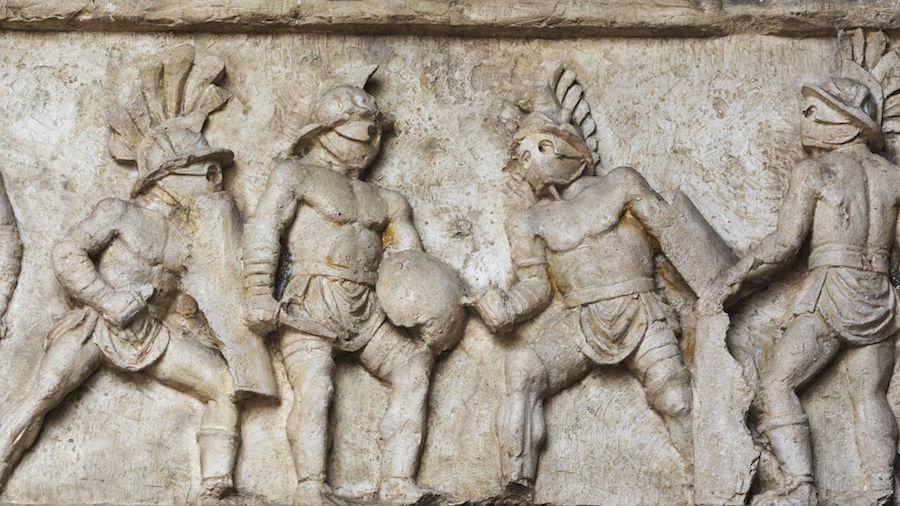



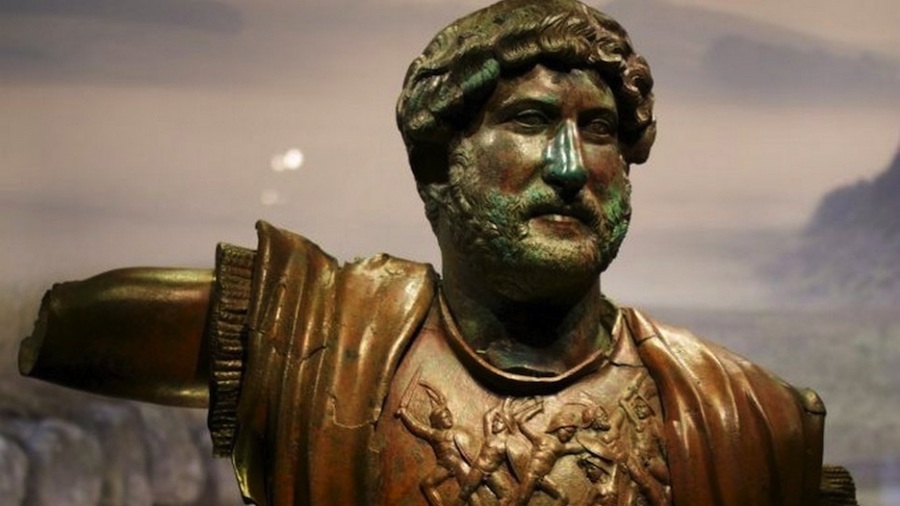





In this statue, the Fighting Gladiators Instantiate Fighting Manhood aka Manliness -- the Willingness and Ability to Fight ; while Hadrian, who trained as a Gladiator, was an ardent PhilHellene -- Lover of Greek Culture --, and had a Beloved named Antinous, personifies the Roman Warrior God Mars.
And this is a statue of his lover Antinous, also in the guise of the God Mars -- the War God :
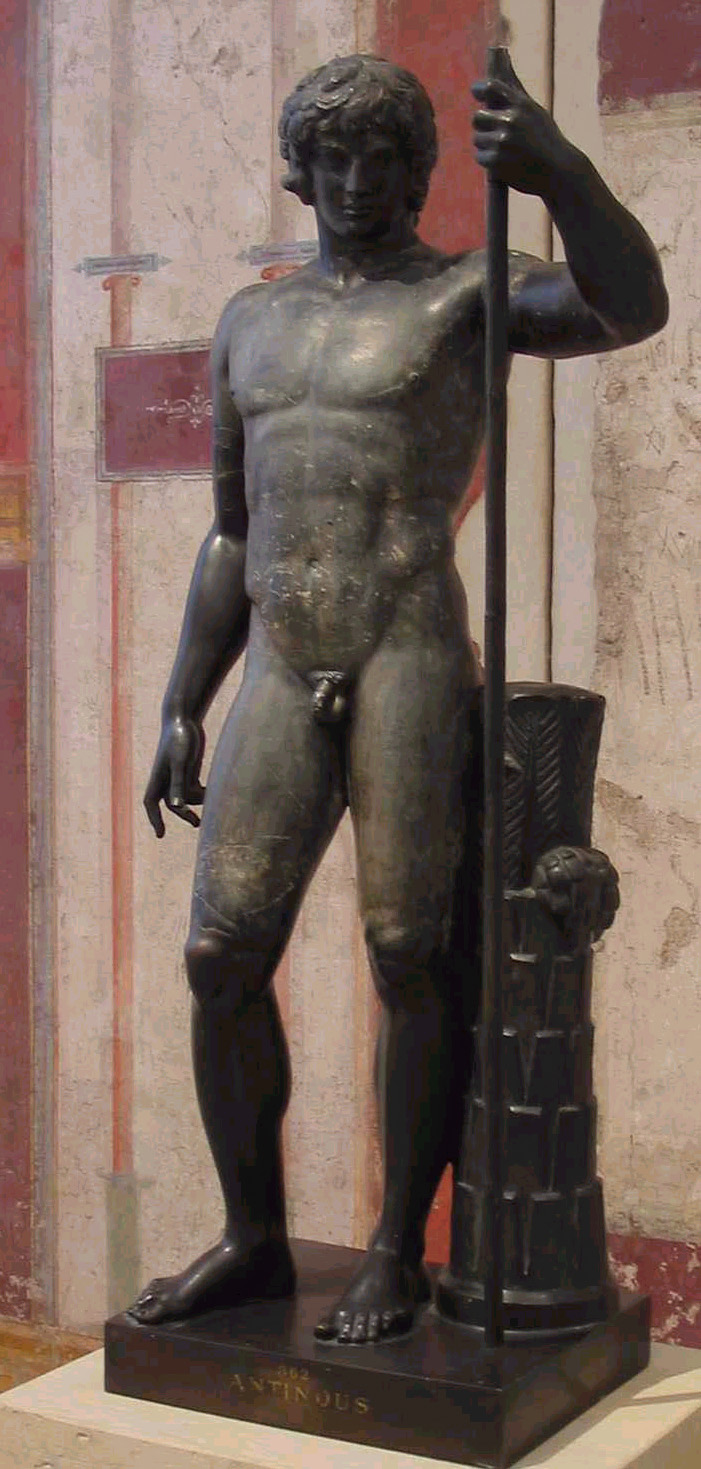
To the Romans, these images, of Hadrian and of Antinous in the guise of the War God Mars, represent, as would any image of Fighting and Fighting Men, the First Notion of Goodness, the First Notion of Virtue, the First Notion of Honour -- which is Manliness and its attendant Fighting :

And Roman life was full of such images :

Again, to the Romans, images of Fighting are images of Manliness -- Virtus -- which like Areté to the Greeks, is the First and Supreme Notion of Goodness and Virtue.
This is an Imperial Roman relief of Boxers and Pankratiasts, who Fought Nude throughout the ancient world, including in Imperial Rome.

Pugna -- Fist-Fight -- was very important to the Romans, as it was to the Spartans.
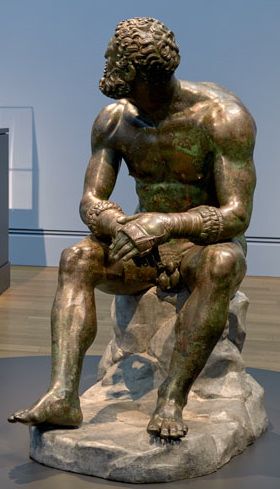
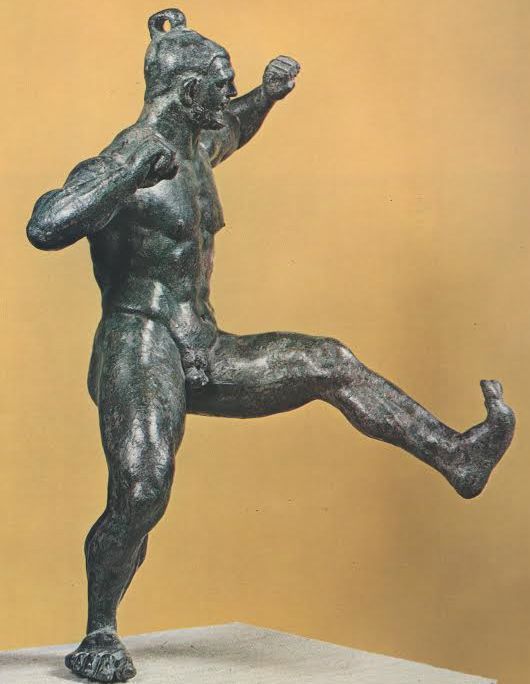
To both cultures, Fist-Fighting was the Foundation of all other Fight, including Fighting with Sword and Shield.
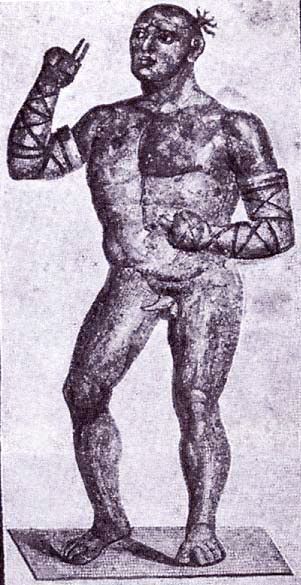
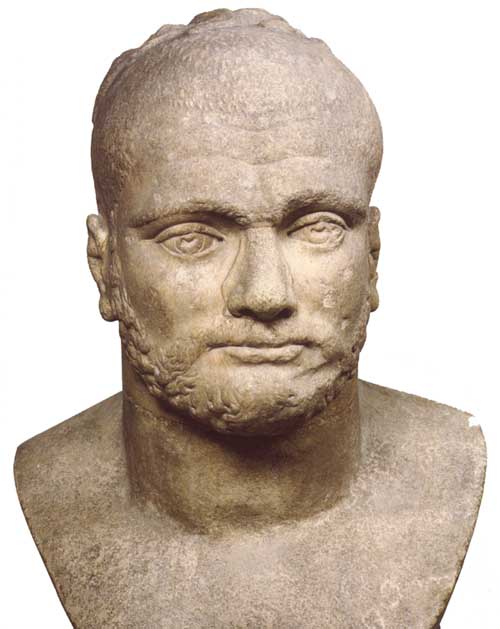
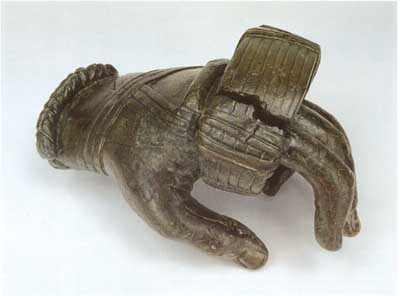

The primary skill of the Roman soldier -- the Legionary -- was Fighting with Sword and Shield in One-on-One Combat.
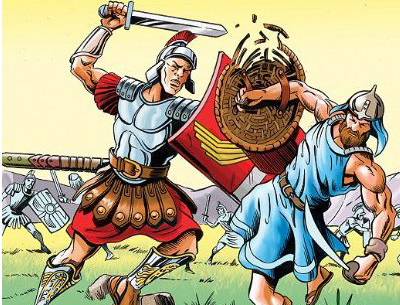
Yes, Legionaries could execute all sorts of intricate mass maneuvers.
But the primary skill of the Legionary was Fighting with Sword and Shield at Close Quarters, in Man2Man, Mortal, Combat.
And that's what Gladiators did :
They Fought, primarily with Sword and Shield, at Close Quarters, in Man2Man, Mortal, Combat.
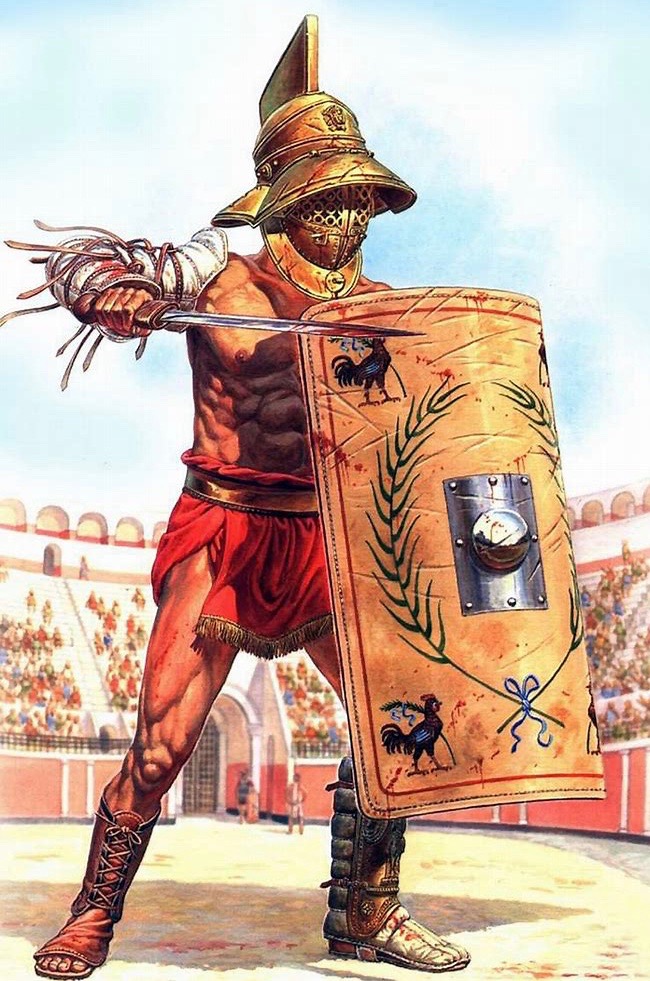
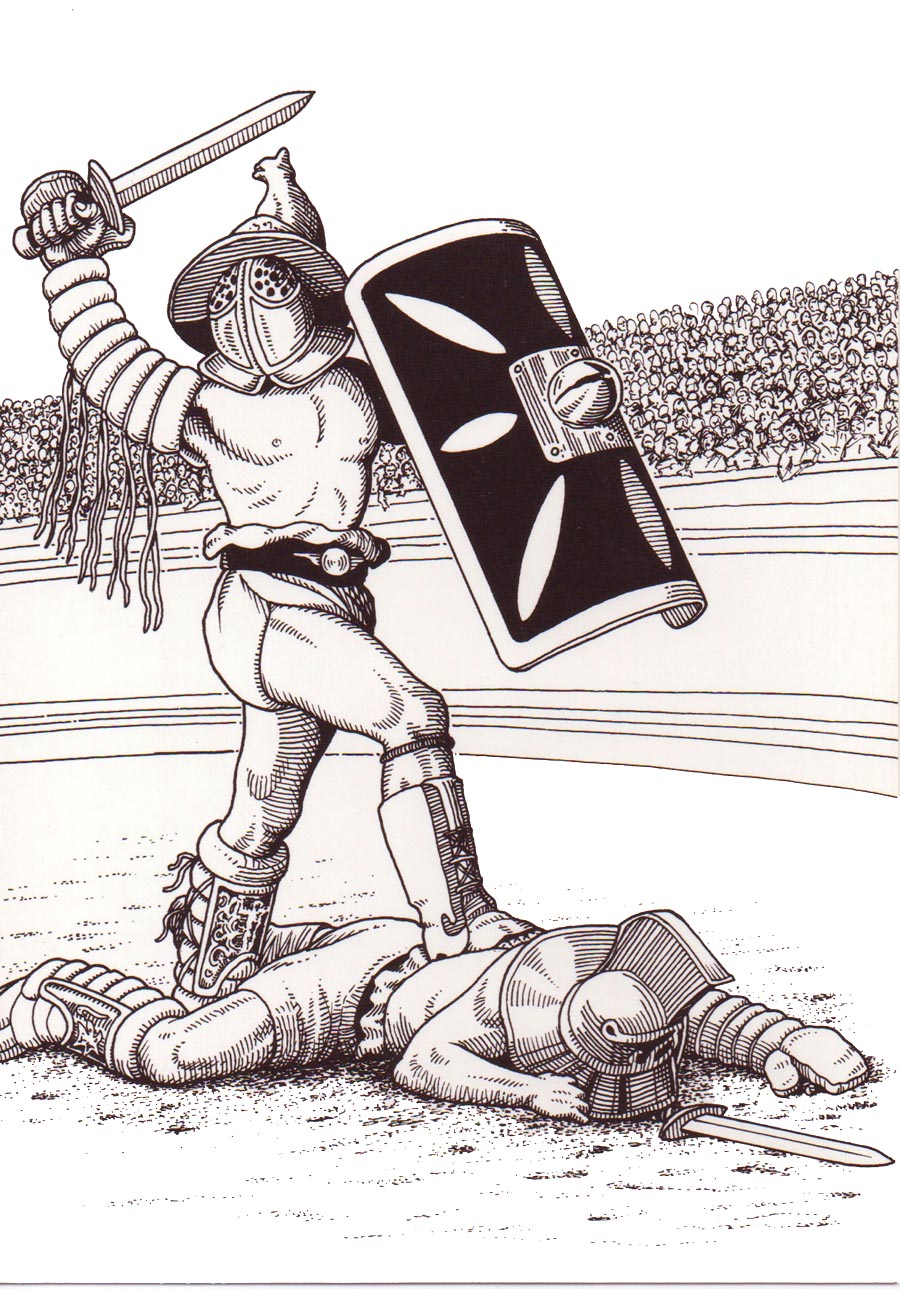




So :
I said that Naked Fighting is impossible to find in our world.
Yet it was normative in the Lives of the Ancients.
And it was worshipped.
While today it's damned.
Why ?
What changed ?
First and foremost, Christianity, which, as EM Forster says, declared war on two great forces : Sex -- and the Greco-Roman state.
The Greco-Roman state funded and otherwise supported the Palaistrai, the Gymnasiai, and the more than 350 festivals of Naked Fight "Sport" aka Fight Agonia.
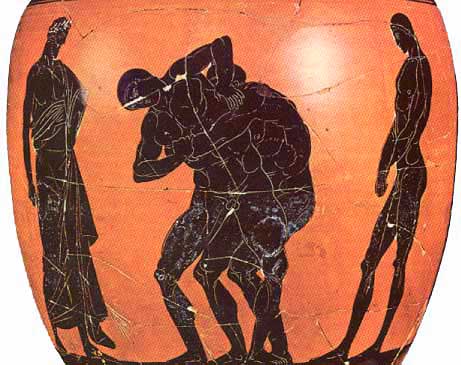
Christianity, once in power, destroyed all of that.
Yet -- the institutions which Christianity destroyed -- could be brought back.
Doing so just requires the will to do it.
But I do mean will.
It can't be done through hedonism, which by definition is weak-willed.
Nor through ethical nihilism, which has no use for those Manly Principles which stand Boldly Erect.
It has to be done through Fighting.

Fighting.
Fighting Manhood -- and Manly Honour.







Plutarch :
And in these wars [polemoi], who would not acknowledge that much Boldness and Manliness [tolma kai andreia] was needed and also, as Timotheos has it,Shame, the helpmate of warring Valour ? [aidw, te synergos aretas dorimachou -- Shame, the helpmate of Fighting Manhood]~Plut. De Fort. Rom. 11, translated by Helmbold and myself.
Bill Weintraub
17 November 2018 ; updated 7 April 2022

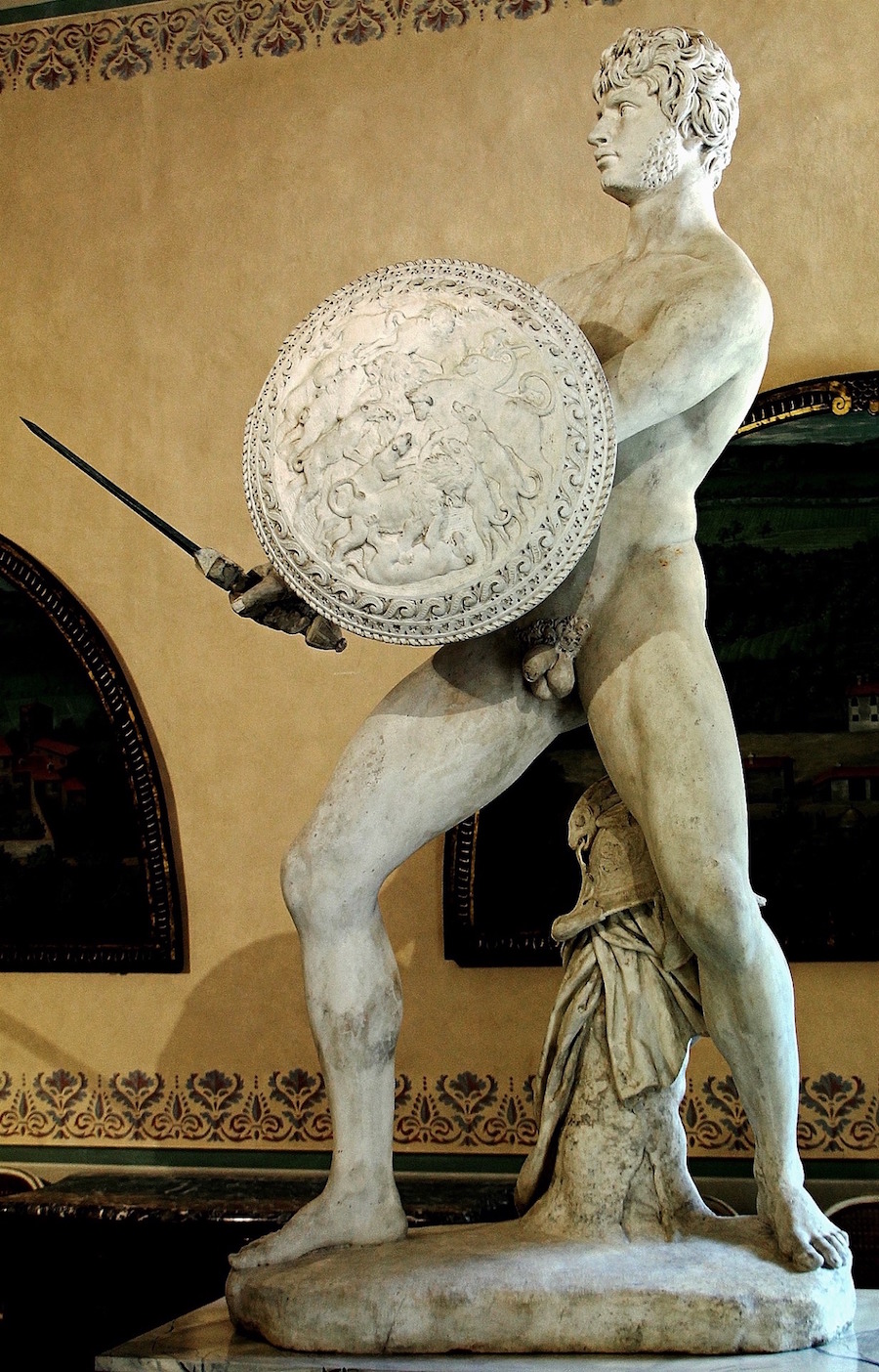













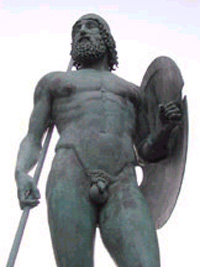















© All material Copyright 1997 - 2022 by Bill Weintraub. 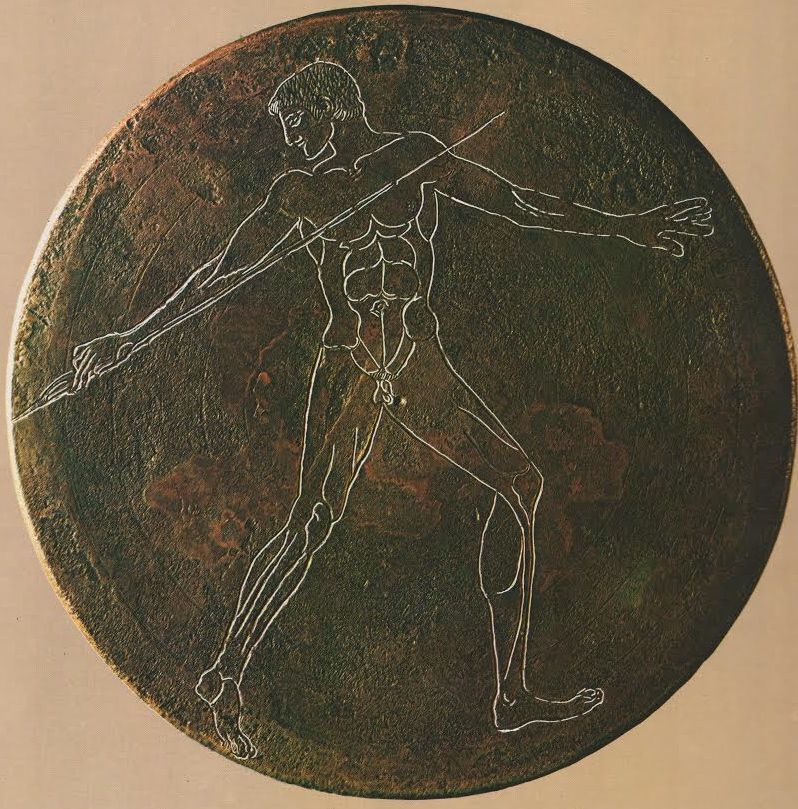
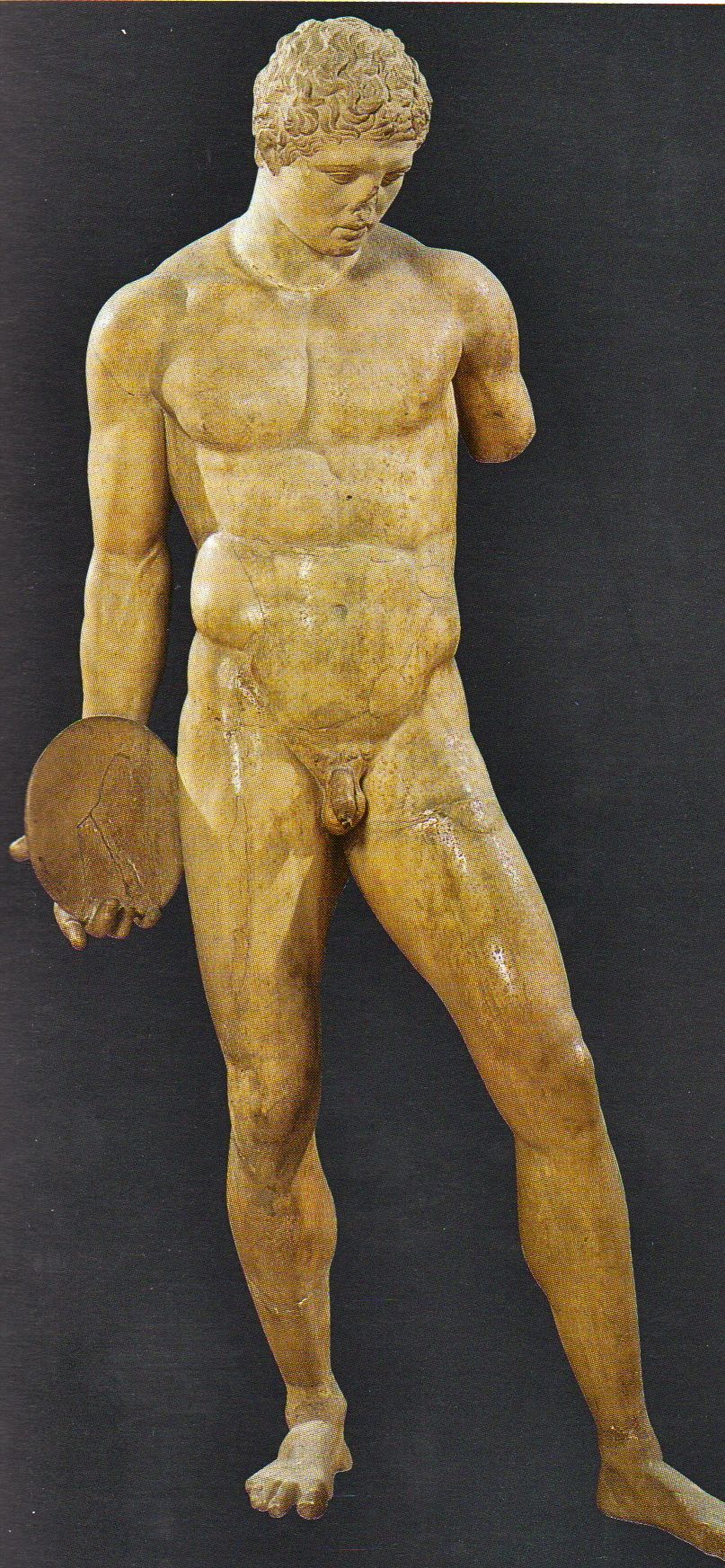

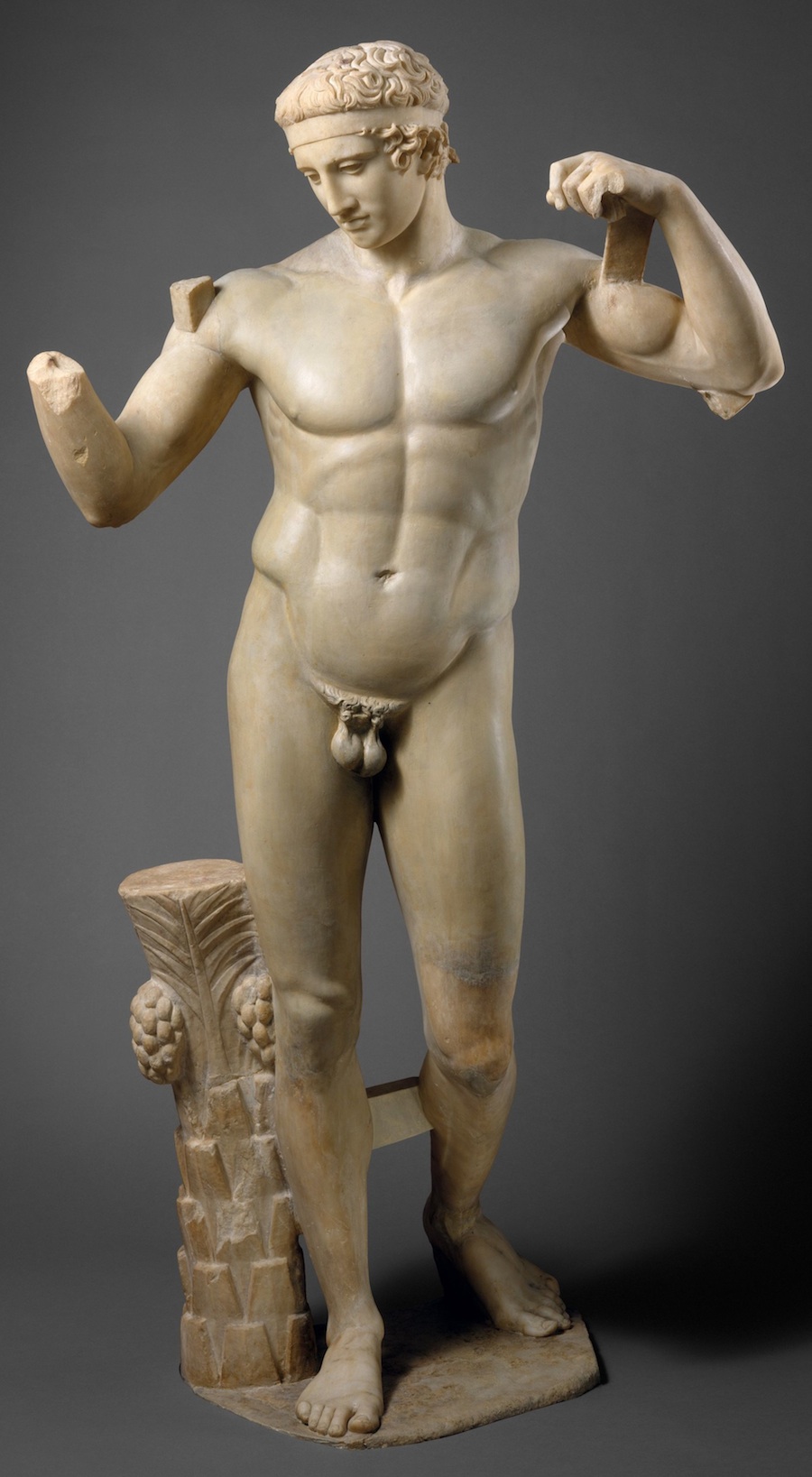
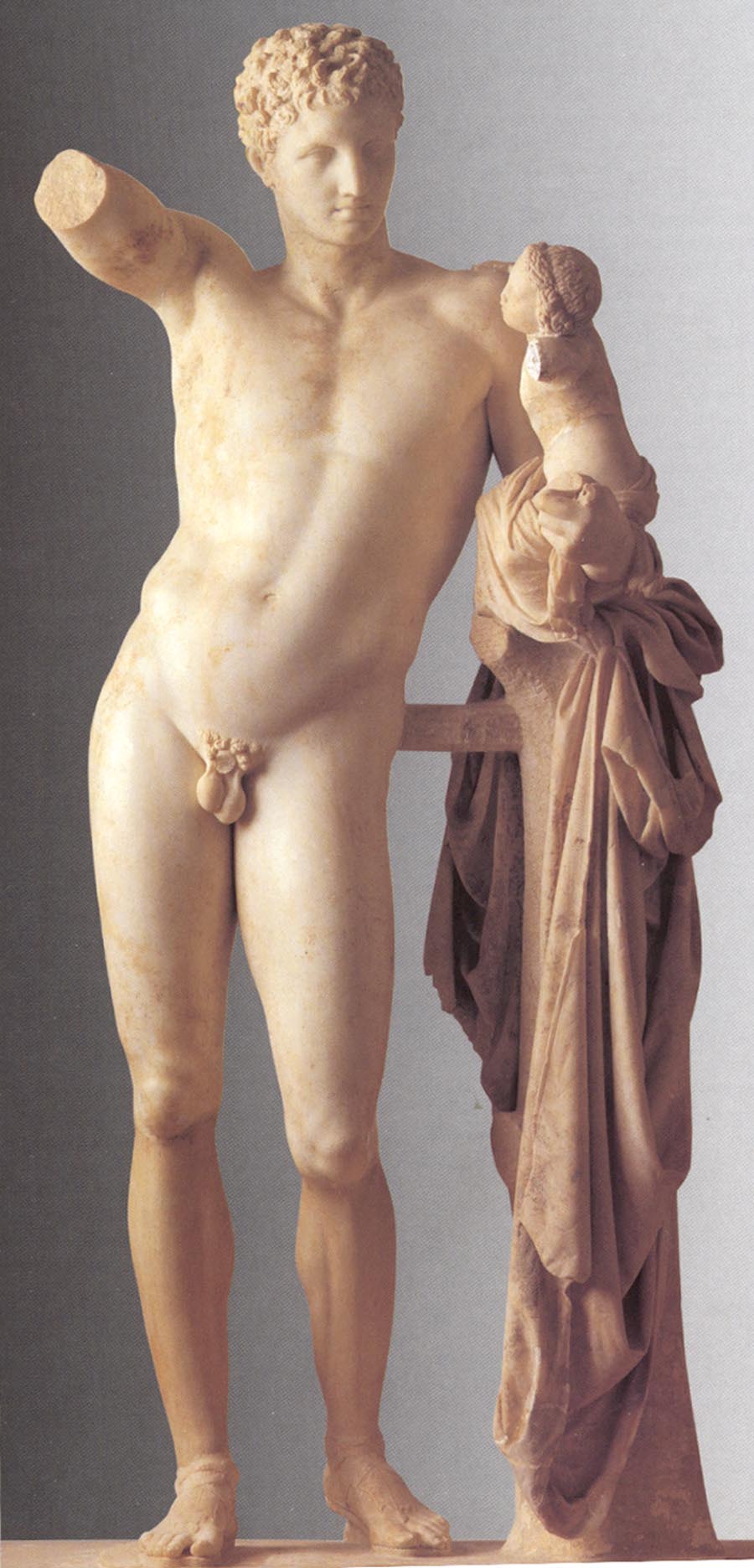
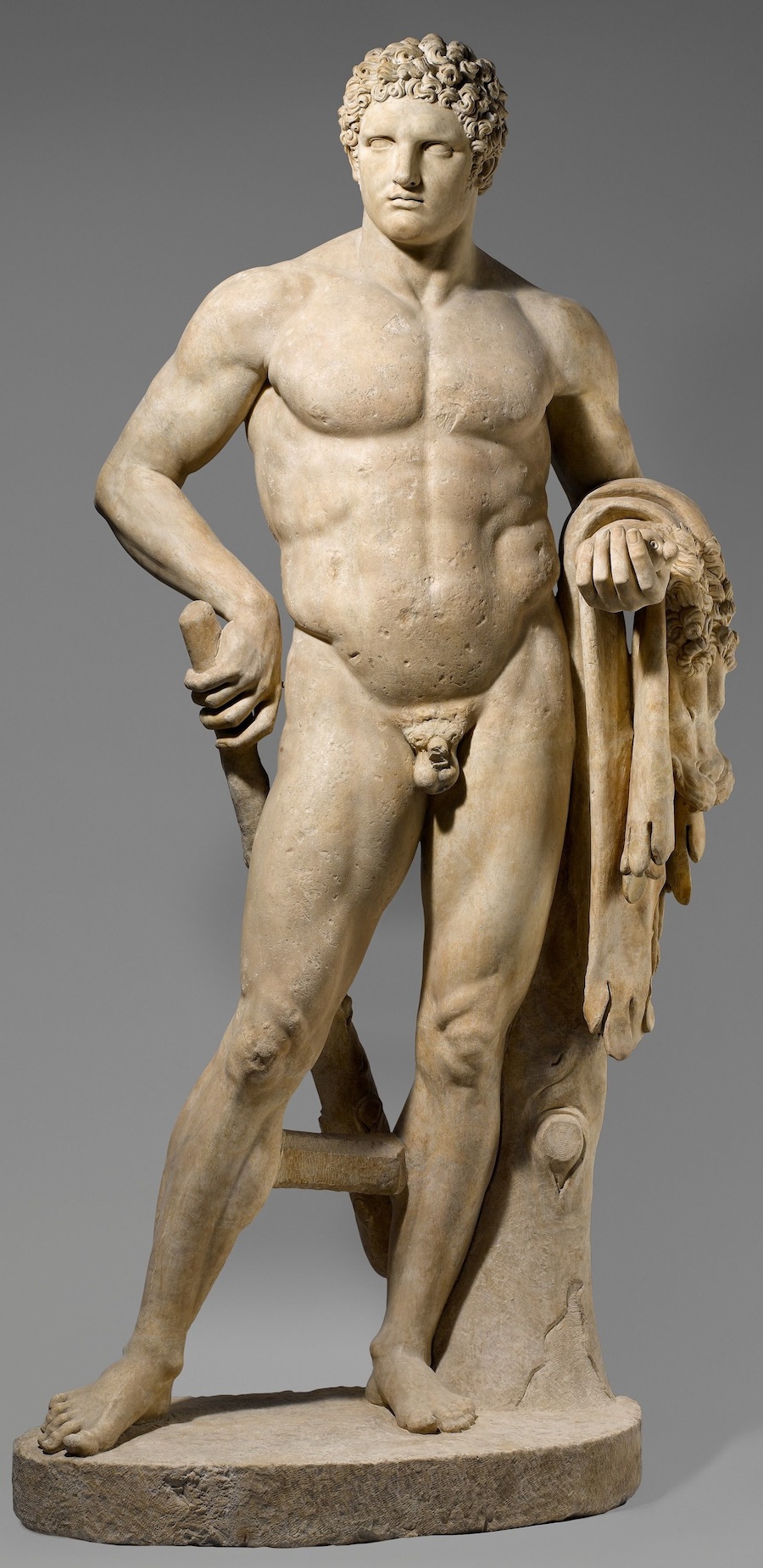

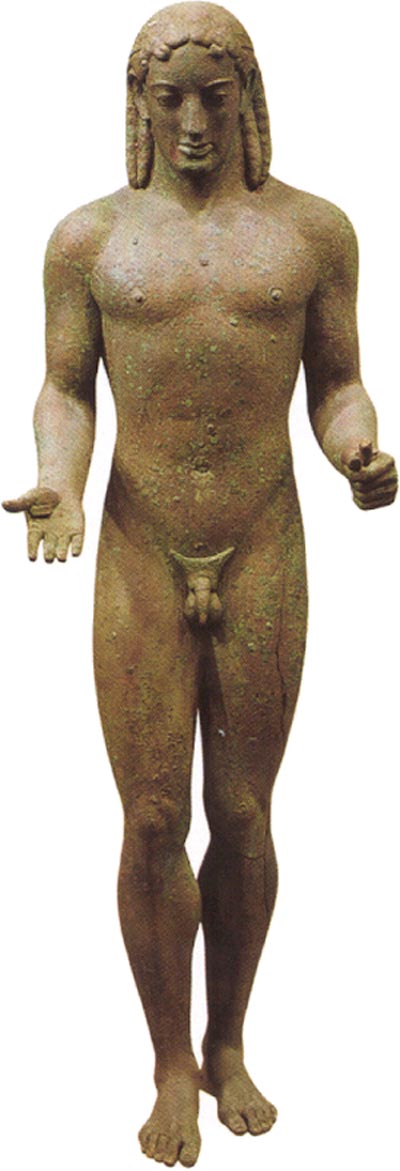
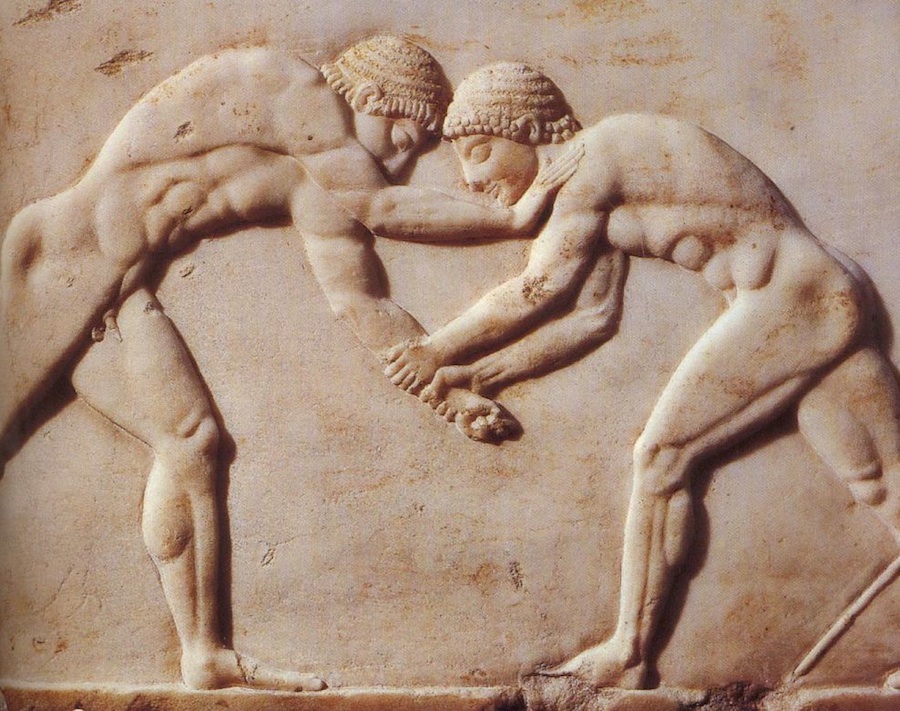








All rights reserved.